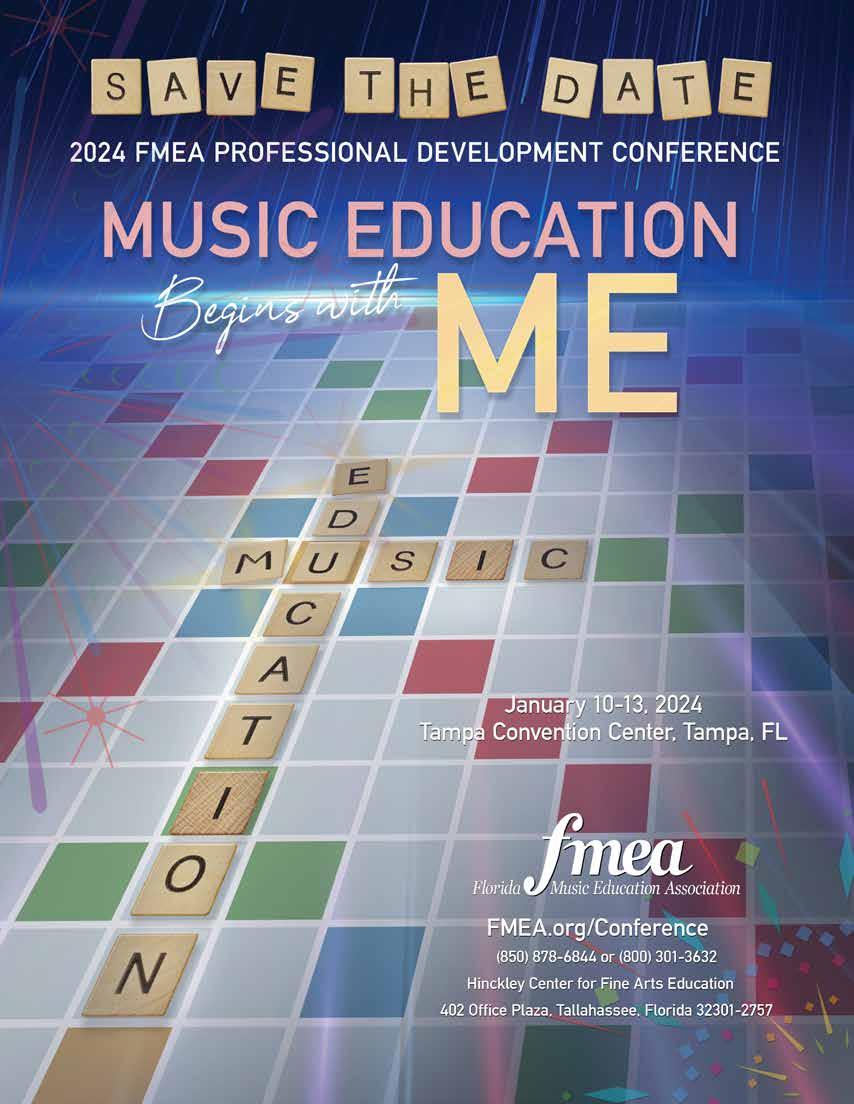Florida Teacher Certification Exams
Assessment Tips for Florida
Preservice Music Educators


Florida Teacher Certification Exams
Assessment Tips for Florida
Preservice Music Educators

PLUS:
FBA Candidates
JuneM.Hinckley
MusicEducationScholarships
PRELUDE TO THE 2024 CONFERENCE


Executive Director Florida Music Education Association

Kathleen D. Sanz, PhD Hinckley Center for Fine Arts Education
402 Office Plaza Tallahassee, FL 32301 (850)878-6844 or (800) 301-3632 (kdsanz@fmea.org)
Editor-in-Chief
Kelly Miller, DMA University of Central Florida 12488 Centaurus Blvd. Orlando, FL 32816-8009 (407)823-4545 (kelly.miller@ucf.edu)
Editorial Committee
Terice Allen (850)245-8700, Tallahassee (tallen1962@hotmail.com)
Judy Arthur, PhD Florida State University, KMU 222 (850)644-3005 (jrarthur@fsu.edu)
William Bauer, PhD University of Florida, Gainesville (352)273-3182; (wbauer@ufl.edu)
Alice-Ann Darrow, PhD College of Music, FSU, Tallahassee (850)645-1438; (aadarrow@fsu.edu)
Jeanne Reynolds (jeannewrey@gmail.com)
John K. Southall, PhD Indian River State College, Fort Pierce (772)462-7810; (johnsouthall@fmea.org)
Advertising Sales
Valeria Anderson (val@fmea.org) 402 Office Plaza Tallahassee, FL 32301 (850)878-6844
Official FMEA and FMD Photographers
Bob O’Lary Amanda Crawford
Art Director & Production Manager
Lori Danello Roberts LDR Design Inc. (lori@flmusiced.org)

Circulation & Copy Manager
Valeria Anderson, (800) 301-3632
Copy Editor Susan Trainor
The Florida Music Director is made possible by the participation of the following businesses whose advertisements appear in this issue. They make

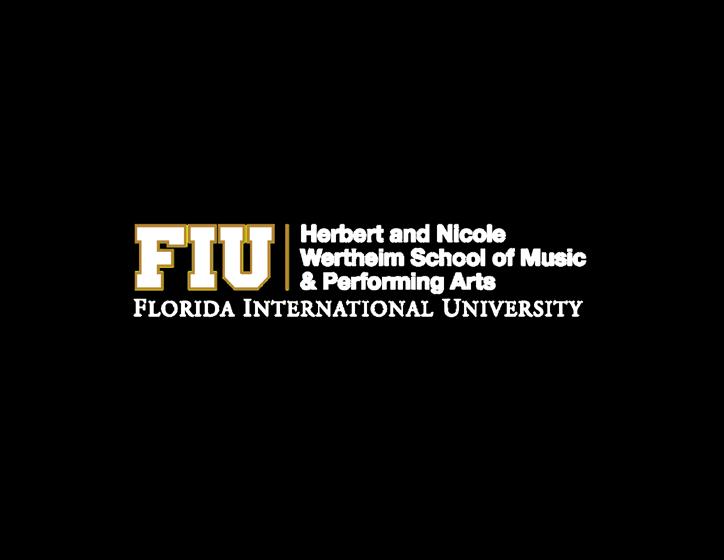
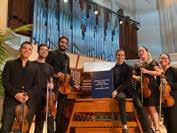
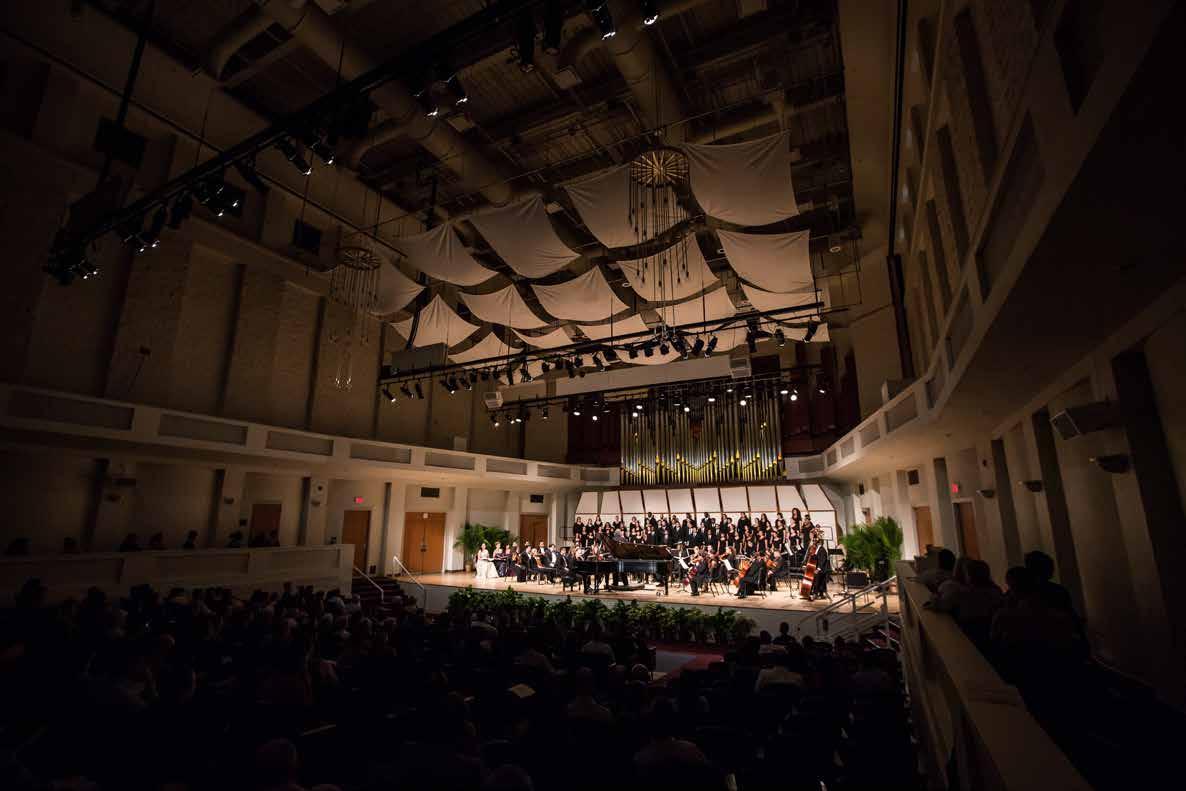

Canyou believe it? The end of the first quarter is already in sight! By now, you have been working hard at creating a caring community, teaching musical fundamentals, and instilling a sense of pride in your students for their work, both individually and collectively. Perhaps you have even had a performance or two (or pretty much every Friday night if you’re a high school band director).
The first weeks of the school year are often a frantic blur of meeting new students and parents, learning names, trying to get class rosters corrected, fitting students for instruments and/or uniforms, making sure all equipment is in good working order, teaching classroom routines and procedures, preparing students for all-state auditions, and so much more. While many of these tasks are mundane and administrative in nature, they are no less essential to launching our students into another successful year of learning and performing music.
Once we get past “beginning of the year” tasks, we start the daily process of building music literacy and expressive artistry with our students. As we listen to our students perform in class, we are constantly making judgment calls about elements of the performance that are satisfactory or that we wish to improve. We are, each of us, musical physicians in our instructional spaces, identifying perceived problems or weaknesses, diagnosing the causes, and prescribing a course of action we hope will lead to improved performance.
Though our students see us as the experts in the room, we will inevita-
bly run into musical moments we want to improve, but find we aren’t sure how best to address them. After all, an infinite number of elements make up each moment of ensemble music-making. Depending upon where you are in your journey as a music educator, the things you have learned, and your own musical preferences, identifying challenges and selecting the best strategies for improvement may be difficult.
So, how do you decide what MEthods to use in your classroom? The very best educators know there is always more for them to learn in order to improve their professional practice. They are constantly searching for tools and strategies to add to their “teacher toolbox.” I have heard it said many times (and have also said myself) that my best teaching strategies are ones I borrowed from another teacher.
The pursuit of newer, better, more efficient classroom MEthods is known as professional development (or professional learning). The Florida Music Education Association is proud to offer our annual Professional Development Conference, a webinar series, summer programs, and other professional learning opportunities. The National Association for Music
Education has launched a new website that gives all members free access to the NAfME Learning Center. But perhaps the most meaningful assistance you can find is the immediate feedback of inviting a colleague into your classroom to observe you or to work directly with your students. It takes vulnerability to acknowledge the truth that you can’t possibly know everything and that there are multiple “right” ways to accomplish anything. It is equally powerful for your students to see you not just as a teacher, but also as a learner.

I am reminded of the game show Who Wants to Be a Millionaire, in which contestants are offered lifelines to help them find the correct answers to difficult questions. Learning new MEthods in an effort to become the best music educator you can be is a never-ending pursuit, which ultimately benefits the students you teach. So, don’t be afraid to “Phone a Friend” for help. We’re all in this together!
Jason P. Locker, President Florida Music Education Association
UNIVERSITY OF FLORIDA
THE DECISION TO MAJOR IN MUSIC
THE DECISION TO MAJOR IN MUSIC
THE DECISION TO MAJOR IN MUSIC
DOESN’T MEAN OTHER ACADEMIC INTERESTS HAVE TO TAKE SECOND CHAIR.
DOESN’T MEAN OTHER ACADEMIC INTERESTS HAVE TO TAKE SECOND CHAIR.
DOESN’T MEAN OTHER ACADEMIC INTERESTS HAVE TO TAKE SECOND CHAIR.
The University of Florida School of Music offers a curriculum designed for students who desire a Bachelor of Music degree, but would like to pursue other areas of study as well.
The University of Florida School of Music offers a curriculum designed for students who desire a Bachelor of Music degree, but would like to pursue other areas of study as well.
The University of Florida School of Music offers a curriculum designed for students who desire a Bachelor of Music degree, but would like to pursue other areas of study as well.
POPULAR OPTIONS INCLUDE:
POPULAR OPTIONS INCLUDE:
POPULAR OPTIONS INCLUDE:
• Dual degree in music and another undergraduate area of study
• Dual degree in music and another undergraduate area of study
• Dual degree in music and another undergraduate area of study
• Music with Pre-Health Professions
• Music with Pre-Health Professions
• Music with Pre-Health Professions
AUDITION DATES
AUDITION DATES
AUDITION DATES
(Freshman, Transfer, and Minor)
(Freshman, Transfer, and Minor)
(Freshman, Transfer, and Minor)
• A combined degree such as Music and Master of Science in Management or Entrepreneurship
• A combined degree such as Music and Master of Science in Management or Entrepreneurship
• A combined degree such as Music and Master of Science in Management or Entrepreneurship
Sat urday, Jan. 20, 2024 • Sunday, Jan. 21, 2024
Sat urday, Jan. 20, 2024 • Sunday, Jan. 21, 2024
Sat urday, Jan. 20, 2024 • Sunday, Jan. 21, 2024
Saturday, Jan. 27, 2024 • Sunday, Jan. 28, 2024
Saturday, Jan. 27, 2024 • Sunday, Jan. 28, 2024
Saturday, Jan. 27, 2024 • Sunday, Jan. 28, 2024
SCHOOL OF MUSIC APPLICATION arts.ufl.edu/music
SCHOOL OF MUSIC APPLICATION arts.ufl.edu/music
SCHOOL OF MUSIC APPLICATION arts.ufl.edu/music
UNIVERSITY OF FLORIDA APPLICATION admissions.ufl.edu
UNIVERSITY OF FLORIDA APPLICATION admissions.ufl.edu
UNIVERSITY OF FLORIDA APPLICATION admissions.ufl.edu

( DEADLINE: NOVEMBER 1)
( DEADLINE: NOVEMBER 1)
( DEADLINE: NOVEMBER 1)
MORE INFO: MUSIC@ARTS.UFL.EDU
MORE INFO: MUSIC@ARTS.UFL.EDU
MORE INFO: MUSIC@ARTS.UFL.EDU
352.392.0224
352.392.0224
352.392.0224
ARTS.UFL.EDU/MUSIC
ARTS.UFL.EDU/MUSIC
ARTS.UFL.EDU/MUSIC
Advocacy is focused on students. Advocacy for funding, recognition, scheduling, and materials should always reference positive student outcomes. But the reality is high-quality teachers and strong music programs are inextricably linked. It’s two sides of the same coin. This month let’s shift our advocacy focus from the student side to the teacher side of that coin and advocate for the profession.
Teaching is hard. Music teaching can be very hard. In politically charged times, it is easy to succumb to negative narratives. Resist that temptation! Reframe the narrative. You are an amazing professional who is capable of work most people cannot do. That’s impressive. If we don’t respect our own work, we encourage others, including elected officials and other decision makers, to devalue the profession. Sadly, some music teachers have been known to discourage promising students from considering a career in music education. That’s counterproductive and diminishes the extraordinary work you do every day.
We must advocate for and elevate our own profession. One of the best ways to do that is to grow the next generation of great music teachers.
The June 2023 Summer Institute Think Tank focused specifically on teacher recruitment and retention. We were fortunate to have NAfME President-Elect Deborah Confredo with us. Dr. Confredo chaired the Music Teachers Profession Initiative, and she shared information about this impressive project. Our own FMEA Past President Steve Kelly was part of this task force as was Dr. Carlos Abril from the University of Miami. The MTPI work resulted in an NAfME publication entitled A Blueprint for Strengthening the Music Teacher Profession. An executive summary of the report can be found HERE.
We owe a debt of gratitude to Dr. Kelly, who has been and will continue to advance this work in Florida. As you peruse these documents, you will be proud to be an FMEA member. Some of the topics referenced have been a big part of our work in FMEA, specifically through the FMEA Summer Institutes.
Jeanne W. Reynolds Chairperson Advocacy Committee
In 2007 FMEA held its first Summer Institute. While not focused specifically on teacher recruitment and retention, it did focus on many of the issues addressed by the MTPI. Building and nurturing comprehensive music programs; reaching more secondary students in meaningful, relevant music experiences beyond band, chorus, and orchestra; diversifying faculty and student bodies; nurturing future music education mentors and leaders; honoring new pedagogical approaches; and staying focused on the future have been key elements of all FMEA Summer Institutes. To have a vibrant teaching force, we need to involve more students in comprehensive, creative, diverse, inclusive, high-quality K-12 music programs. We grow new teachers by nurturing strong music programs.
The MTPI outlines concrete steps to address teacher recruitment and retention. In other words, it goes from ideas to action. Hence the title, A Blueprint for Strengthening the Music Teacher Profession.
Three distinct focus areas emerged:
w Before the degree program (K-12 educators have great influence in this area)
w During the degree program
w During the first five years of professional life
President Jason Locker’s theme could not be more relevant. We all have a role to play in elevating our profession. Make a commitment to take one small action each week to strengthen the profession. An easy, good first step can be reading the executive summary of A Blueprint for Strengthening the Music Teacher Profession.
The best way to honor the music teachers who inspired you is to inspire the next generation of music educators. It is past time to advocate for our profession. You deserve nothing less.
Jeanne W. Reynoldssubmitted the following essay with his application for the JUNE M. HINCKLEY

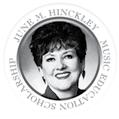
MUSIC EDUCATION SCHOLARSHIP.
Applicants were asked to respond to the prompts “Why do you wish to become a music educator?” and “Why should music be available to all students?” Brandon graduated from Lawton Chiles High School in Tallahassee, and he is attending Florida State University. Brandon’s essay appears here with minor editing and the addition of a headline.
Eversince my first year of middle school, music has been the most motivating factor in my life. I became motivated to practice for concerts and prepare for the next auditions. But most importantly, I had found my passion. As my career progressed, I became more and more invested in music. I started by playing the French horn, and now on top of that I regularly play bassoon, cello, and drum set. I started taking theory classes in high school, and I then began to write my own music. Although unique, I guarantee I am not the only person with this story, and there is a reason for that. Music educators are the soul provider and motivator of every music student, whether they are your band director, lessons instructor, or all-state clinicians. Music brings people together and gives people something to work for and enjoy. That is exactly why I plan to become a music educator. There is no feeling close in comparison to the joy music brings me, and I would like nothing more than to give that feeling to others.
Originally, I was unsure if I wanted to take band classes. My middle school offered limited electives to take and not many of them were enticing. Also, nobody at first really wants to be a “band kid.” Since I enjoyed listening to music on the radio, I took band class anyway. At first, I didn’t have high hopes for music, but my director, Mrs. Dunaway, changed that quickly. She let everyone in the class try three instruments of their choice and hired professionals to play for the kids, and by then I was hooked. Mrs. Dunaway was a horn player, and she demonstrated the horn for the class, and in the first few seconds I was hooked. Her playing was inspiring and showed me what could become of me if I worked hard. It didn’t take long for me to start coming in every morning and staying as late as Mrs. Dunaway.
In class we could challenge each other every three days with new material. There were two horn players other than me, but one of them had the same amount of drive as I did. His name is Sam. Quickly Sam and I had constant battles every three days
for first chair, and every time the second chair won with some exceptions. To this day I still believe it was the competition between Sam and me that gave me the motivation to keep going. As I matured, I came to realize that Mrs. Dunaway always let the second chair win so that come the next three days there was always another challenge. Mrs. Dunaway always saw something in me and worked her hardest to help me succeed. Every day she had the chance, she would give me lessons after school. I had to have taken about $5,000 worth of lessons for free by the time I graduated middle school. If I never had Mrs. Dunaway to teach and inspire me, I wouldn’t even be able to apply for this scholarship. But she is a big reason why I want to be a music educator. I hope that one day I can give to students what she gave to me.
Because of how much I practiced and how good I got at horn, the high school band wasn’t at the level I had hoped for me. Once again, I didn’t have much hope of learning anything, but I couldn’t be more incorrect. During marching season, the band is practically run by its student leadership, and they are overseen by our band director, Mr. German. When I saw my drum majors Marley and Dippy conduct and rehearse the band, I wanted to be drum major as soon as I could. I became section leader my sophomore year, but unfortunately I couldn’t do much because of COVID. I worked hard that year for my drum major audition and my work paid off. Junior year I became assistant drum major and finally was able to begin to teach people. It didn’t take long before I fell in love with all of it, even the things people don’t really have fun with, like score studying and responsibility. Since then, I’ve always loved being in leadership to help others become the best they can be.
Through my music career, these people around me have shaped me into the musician I am today. Music has given me something to be passionate about and something to love. The feeling I get when I learn something new or play something right
continued on page 10
submitted the following essay with his application for the JUNE M. HINCKLEY

MUSIC EDUCATION SCHOLARSHIP.
Applicants were asked to respond to the prompts “Why do you wish to become a music educator?” and “Why should music be available to all students?” Damon graduated from University High School in Orlando, and he is pursing the BME at the University of Central Florida. Damon’s essay appears here with minor editing and the addition of a headline.
Music has always been an influential aspect of my life. My love for music began when I was just a kindergartener. My elementary school music teacher helped to light that spark that led me to where I am today. For years, I have developed my musical abilities, and I am now on the path to becoming a music educator like my teachers before me. Music has always been an outlet to express myself and to show my true colors both on stage and in the classroom. Although my passion for music depends on my own efforts to improve my skills as a musician, I also needed the guidance and inspiration from the directors who pushed me to be the best musician I could be. I would not be where I am now if it were not for their own efforts to inspire and support me along the way. They are the reason why I have found my calling and now I strive to do the same for my future students.
My involvement in the University High School Performing Arts Department first began in the summer of 2019 when I joined the marching band. We spent months rehearsing in the heat and rain, which, as a freshman, I did not know would be worth it until the end of the marching season. However, my band directors pushed me to keep going to see what our competitions were all about. We ranked seventh at BOA regionals and second in 4A at FMBC in the fall of 2019. Yet, our placements in these competitions were not the best parts of the experience. It was being on that field with hundreds of families cheering us on. I was so proud of the work I was able to accomplish alongside my fellow musicians. Little did I know, this was only the beginning of my experience in the performing arts programs at University High School. After COVID hit, I decided to focus more on what the choral department had to offer, and looking back I know I made the right choice. Since then, I have been a part of the AllState Mixed Chorus in 2022 and 2023, the All-County Chorus in 2022 and 2023, and the FL-ACDA Chorus in the fall of 2022. I have also taken part in solo and ensemble for the past two years,
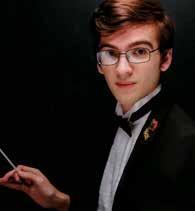
both for the vocal solos and as a student conductor. With the help of my directors and my vocal coach who I have just started working with this year, I was able to achieve superiors for both at the state level. I have accomplished so much in the past couple of years because of the opportunities that the music department and my directors have given me.
I want to provide my future students with the opportunities that my directors gave me so that they too can be successful in music. Opportunities and experiences are the things that build a passion. After all, music is not just getting awards, trophies, or ratings at the state level. Some experiences are their own rewards. I loved being a part of the Candlelight Processional and putting on shows for hundreds of people alongside singers from high schools all across Florida and beyond. I also appreciated the contrast of caroling at Give Kids the World where even though it was only for a few children, we still brought joy to those kids and to ourselves. I still remember the little girl who sang and danced to our carols, and that gave me an entirely different perspective on why we perform for others. I want to be a music educator not just for awards or even only to teach my students the right musical techniques, but to inspire them to leave a positive impact on themselves and everyone around them. Music connects us all, and I want to teach them how to build those connections so that they can do something great and inspiring for others.
I believe that music should be available to all students throughout their education from kindergarten to 12th grade because it plays such a vital role in our cognitive development and helps build the foundation for many of our life skills. Being a musician has helped me especially throughout middle and high school because it teaches the importance of critical thinking, discipline, and structuring a schedule around numerous rehearsals alongside an advanced academic curriculum. I have managed to balance my own workload between the busy performing arts continued on page 10

continued from page 8
is almost a high; I just want more! This is the reason why music should be available to everyone. I can make that a possibility by serving as a music educator in any capacity. But I don’t just want to be any music educator. I want to be the Mrs. Dunaway and Mr. German of tomorrow. Someone who inspires people to work toward their goals and gives people the opportunities to help them grow.
We’ve all heard the phrase “Music is the universal language.” This is because music can be enjoyed by everyone. With that said, what reason is there for people to not listen to music? Even if someone doesn’t understand music theory to the most amateur degree, they still are able to appreciate anything they hear. But, if you do understand theory, you are able to appreciate the structures and chord progressions and the counterpoints. Many people unfortunately are not capable of that level of appreciation simply because of where they live, their at-home life, or their financial situation.
But that is one of many reasons why I want to become a music educator. I know all too well it only takes one person to change the whole direction of your life, and I want nothing more than to be that person to someone else.
continued from page 9
schedule and my Advanced Placement classes throughout high school. Although being a musician has added a lot more on my plate, the skill-building of these music programs is most likely the reason why I have been academically successful during my time at University High School.
I cannot possibly imagine my life without music or the music educators that have pushed me thus far. Without music, my life goals might be vastly different. Without music, I would lack the skills needed to achieve academic success for any other possible career. Without music, I would not have a place that I could call my second home. As musicians, we can’t think of what would happen to us if we lost that which has given our lives so much meaning. Only, it has happened before. When COVID hit, I spent my sophomore year on LaunchEd, somehow managing to get by. It was extremely difficult to learn through a screen, and musicians all over the world struggled to balance their careers and passions with the safety precautions put in place. I had everything I loved about school taken from me that year. Losing my music classes was detrimental to my mental health and my academic success. Yet, my choral directors somehow managed to maintain even the slightest connections with their students, including myself, throughout the pandemic. As they worked harder than ever to give their students an education, I realized then how important music is for everyone in school. We need music to be available to all students, no matter what the circumstances are. Music is what keeps us together, even in times when we feel most disconnected.
Music and the arts are crucial to ourselves, our education, and our society. Knowing what it is like without it, we must keep it alive in order to build connections with people all around us. Music is an escape from reality for some, but for me, music is what makes me feel most alive. Just a few years ago, I had no clue what I would be doing with my life after high school. But one odd day during my junior year, I walked through the doors of the chorus room and realized I was smiling. It occurred to me that I wait all day, every day, just to be in the chorus room again. I knew right then and there that this is where I belong. This is where I want to be, and I want to create that environment for my students. I want to be a music educator because there is no greater feeling than knowing you have changed someone’s life for the better.
Ashley Crosby is the director of bands at Corkscrew Middle School in Naples, Florida. She received the BME from Florida Southern College in 2006 and the MM from Western Illinois University in 2009. Ms. Crosby has been teaching for 15 years in Naples. Prior to her appoint ment at CMS, she taught at Golden Gate Middle School and Manatee Middle School. Her concert and jazz bands consistently earn superior ratings at music performance assessments. Ashley has been awarded both the Linda Mann Award for concert band and the five-year Superior Award for jazz. She has presented at in-service clinics at both the state and local levels, and she serves as an active adjudicator throughout the state.
Ms. Crosby has received several accolades throughout her career, including Teacher of the Year in 2013, and most recently she received the Collier County “Golden Apple” award in 2023. She has also been awarded over $50,000 in grants for her programs over the years.
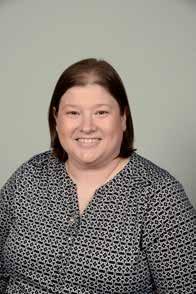
Ashley has served the FBA in various roles. She was the district chairperson in District 18 from 2014 to 2018, district treasurer, and is currently serving as the junior high/middle school representative on the Executive Board.
Richard Uhler is in his 15 band director, and 17th year over all, at Pioneer Middle School, serv ing previously as the chorus direc tor. Richard is a proud alumnus of Pioneer Middle School, having par ticipated in both band and chorus while a student. Richard is a 2003 graduate of the Broward County school system and received the BME from the University of Miami in 2007. His current teaching duties at Pioneer Middle School include Wind Ensemble, Symphonic Band, Concert Band, three Beginning Bands, and a before-school Jazz Band. Mr. Uhler’s bands have consistently earned superior ratings at the concert band music performance assessment. Mr. Uhler has twice been awarded the Linda Mann Five-Year Superior Award, in January 2016 and January 2021. He is an active member of the Florida Bandmasters Association, serving a two-year term as secretary of District 15 from 2015 to 2017 and a three-year term as chair of District 15 from 2017 to 2020.
At the school level, Richard has served as chair of the Unified Arts Department for the past 10 years and is in his fourth year of serving as chair of the School Advisory Council. Mr. Uhler served as a coordinator for the Broward County Band Directors Association from 2021 to 2022. He served as the coordinator of the FBA 9-Star Honor Band during the summers of 2015, 2016, and 2017. He also served as the on-site coordinator for the Middle School Honor Band in January 2016. Richard is a member of the FBA Concert Music Committee and the FBA Solo and Ensemble Committee.
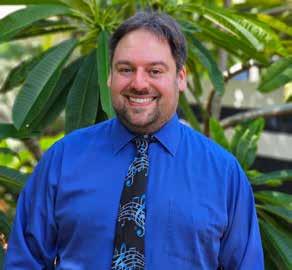
Mr. Uhler received the honor of Teacher of the Year in 2012 and 2022 at Pioneer Middle School. His professional affiliations include the National Association for Music Education, the Florida Music Education Association, the Florida Bandmasters Association, the American School Band Directors Association, and the National Band Association.
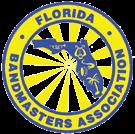

Michael Antmann is in his 23rd year as a music educator and his eighth as band director at Freedom High School. He earned bachelor’s and master’s degrees in music education from Florida State University and the EdD from the University of Central Florida. Prior to his current position, he served as the music resource teacher for Orange County Public Schools and as band director at Bridgewater Middle School in Winter Garden, Florida, and Swift Creek Middle School in Tallahassee, Florida.
During his 12 years as a middle school band director, Dr. Antmann’s bands consistently earned superior ratings at music performance assessments (MPA) while experiencing significant growth in enrollment. The band at Swift Creek grew to include 300 students and earned performance invitations including the 2004 University of Georgia Middle School Band Festival and the 2006 CBDNA/NBA Southern Division Conference. While at Bridgewater Middle School, the band program enrollment grew to more than 500 students and earned performance invitations for the 2011 and 2014 FMEA conferences.
Dr. Antmann has served as the band director at Freedom High School since 2016. Under his direction, the program has earned multiple Otto Kraushaar awards for year-long superior ratings. The Symphonic Winds has received invitations to perform at the 2021 Music for All/UCF Southeastern Concert Band Festival, the 2023 FMEA President’s Concert, and the 2024 CBDNA/NBA Southern Division Conference. The marching band, The Pride of the Patriots, has recently performed in both the National Cherry Blossom Festival parade in Washington, D.C., and the Chicago St. Patrick’s Day Parade.
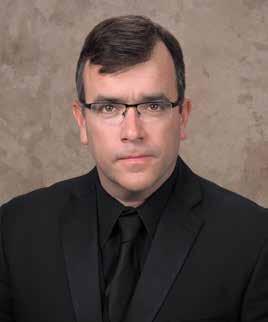
Dr. Antmann is in demand as a clinician, conductor, and adjudicator. He has presented sessions at state and national conferences and has served as a guest conductor for honor bands throughout Florida, including the 2012 Florida All-State Middle School Honor Band. He has been awarded two Citations of Excellence from the National Band Association, the FBA Tom Bishop Award, Teacher of the Year, and the 2010 and 2018 OCPS/ Kessler Grand Bohemian Excellence in Teaching Fine Arts Awards. He was also a national semi-finalist for the 2019 and 2020 GRAMMY Music Educator Awards. Most recently, Dr. Antmann received the FBA Oliver Hobbs Award.
Throughout his career, Dr. Antmann has been an active participant in his professional organizations, which include FMEA, FBA, NBA, and the FMEA Multicultural Network. In the FBA, he served five years as a district secretary and two as a district chairperson. He has also served as the chair of the Solo & Ensemble Music Committee and currently serves as the chair of the Adjudication Committee. In FMEA, he has served as the chair of the Student Engagement Committee. In 2015, based on the vision of John Southall, he developed the Student Conference Experience and the Tri-M Experience. These programs have grown to include as many as 200 students, many of whom are interested in pursuing music education as a career. Dr. Antmann also is an instructor and co-founder of the Florida Band Director Workshop in Titusville, which is an intensive and interactive workshop focused on conceptual teaching and band pedagogy.
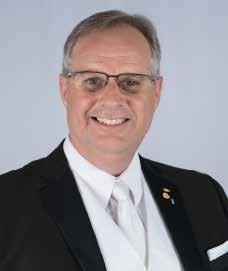

Jody Dunn is a proud product of the Florida Bandmasters Association. He is a 1986 graduate of Crestview High School (District 1) where he now holds the position of band director. While a junior high student, he was the principal trombonist of the Florida All-State Jr. High School Band, and as a senior, he was the principal trombonist of the Florida All-State High School Symphonic Orchestra. He was selected to the Florida All-State Honor Band and chose membership in the Florida AllState Choir as a junior. He went on to earn his music education degree from the University of Southern Mississippi in Hattiesburg, Mississippi, in 1990. While at USM he was a member of the Pride of Mississippi Marching Band, in which he served as section leader and vice president. He was a member of the Wind Ensemble, the Symphonic Band, Jazz Lab I, and the Trombone Choir. He performed with USM Chorale and Men’s Choir, and was a founding member of the USM Jazz Singers.
Upon graduation from USM, Mr. Dunn accepted the position as director of the Pickering High School Band in Leesville, Louisiana. Under his direction, the band received its first ever superior ratings. In 1993, he returned to his hometown of Crestview and became the assistant director of the Richbourg Middle School Band and Chorus until 1996. From 1996 to 2006, Mr. Dunn was the associate director of bands at Crestview High School. While serving as the associate director, he was the visual coordinator of the marching band as well as the director of the Concert Band and Jazz Ensemble II. He assumed his current position as director of bands at Crestview High School in 2006. He conducts the Wind Ensemble and Jazz Ensemble I, and oversees three additional concert bands, per-
cussion, chamber winds, instrumental techniques, and the Big Red Machine marching band. Under his direction, the Crestview Band has received the Otto J. Kraushaar Award several times. In 2011, Mr. Dunn was a clinician/ conductor for the Southeastern United States Honor Band at Troy University. In 2012, the Crestview High School Band was featured in the 123rd Tournament of Roses Parade in Pasadena, California. In 2014, the Wind Ensemble performed at Carnegie Hall in New York City. In February 2017, the Wind Ensemble performed at the Southeastern United States Concert Band Clinic in Troy, Alabama. In spring 2019 and 2023, Mr. Dunn served as the guest clinician/conductor of the MatanuskaSusitna Honor Band in Palmer, Alaska. In January 2020, he was the clinician/conductor of the Florida All-State High School Honor Band. In spring 2023, he was the guest clinician/conductor for the South Pointe Middle School Wind Ensemble’s (Diamond Bar, California) performance at Symphony Hall in Boston, Massachusetts.
Mr. Dunn is active as a clinician and adjudicator throughout the Southeast. He has served on the State Executive Board of FBA. He recently chaired the FBA Ethics Committee and currently serves as the chairman of the FBA Marching Band Task Force. He is a recipient of the Certificate of Merit from the National Band Association. He is a member of Phi Mu Alpha Sinfonia, FMEA, NAfME, NBA, ASBDA, and Phi Beta Mu International Bandmasters Fraternity, in which he has served as president of the Omega Chapter. Mr. Dunn received the 2020-21 FBA Oliver Hobbs Award.
Jody is the proud father of Olivia, Elizabeth, Joseph, and Elijah.
The FMEA Professional Development Conference is one of the largest music education professional development events in the United States. In addition to approximately 250 clinic sessions and concerts, it is host to 23 all-state ensembles featuring Florida’s top band, orchestra, chorus, guitar, Orff, and popular music students conducted by world-class conductors and teachers.
It is attended by more than 10,000 people, including secondary music directors, elementary music teachers, music supervisors, college students, college music teachers, school administrators, K-12 students performing in the allstate ensembles, students and professional musicians performing with invited performing ensembles, exhibitors, and parents and family members of performing students.
An exhibit hall with world-class exhibitors providing products and services for music educators and students
More than 2,800 music teachers and 200 administrators
More than 120 sessions, covering a variety of topics for all music educators, with on-demand access to recordings after the conference
Performances and mini-concerts from some of Florida’s top music programs
Networking opportunities, college fair, awards ceremony, and other special events

(subject to change)
October 1, 2023
Presenters’ deadline for editing session details and requesting A/V equipment
October 1, 2023
Presenters’ deadline for editing session details and requesting A/V equipment
November 11, 2023
Hotel room cancellation deadline 5:00 pm
November 13, 2023
Hotels will charge your credit card a nonrefundable deposit for the first night of each room.
December 11, 2023
Early registration closes at midnight. You may continue to register online but at the higher regular registration price.
December 15, 2023
All school lodging checks are due, payable to the hotel where reservations were made for you and/or your students.
December 15, 2023
The final deadline for discounted hotel blocks; unsold rooms in the FMEA blocks are released back to hotels.
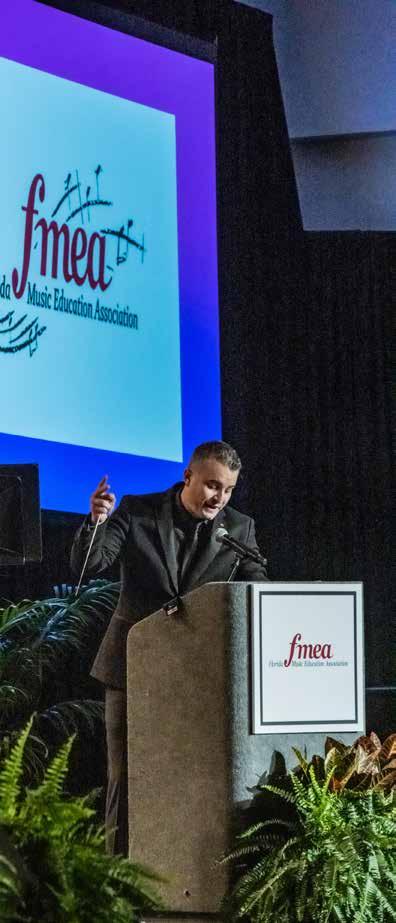
December 15, 2023
Postmark deadline for checks to be mailed for conference registration; all unpaid registrations must be paid by credit card after this date.
Membership in FMEA and NAfME is a prerequisite for registration. See the Registration Policies for details.
To take advantage of early discounted rates, you must register and pay before the deadlines.

Note: If you are mailing a check to the FMEA office to pay for your registration, it must be postmarked early enough so that it will ARRIVE in the FMEA office before the preregistration deadline.

1. All participants—directors, students, chaperones, and guests—must be registered for the conference.
2. Only directors may register their groups or pick up registration materials if preregistered.
3. All participating students must be chaperoned. As required by FMEA and FSMA, at least one chaperone other than a director is required for every ten (10) students or fraction thereof; however, FMEA policy allows for one free chaperone for every six (6) students or fraction thereof.
4. An additional paid chaperone may be registered for (a) each six (6) students registered or (b) for each all-state rehearsal site where registered students are performing.
5. If a participating student is not accompanied by the director from that student’s school, then the principal from that school must furnish a letter designating the person from the school or school district who is to be in charge of that student. The letter should be addressed to the FMEA executive director, must explain the extenuating circumstances preventing the director from attending, and must be submitted with registration materials. The school will be notified of approval.
6. Student observers are not allowed to attend the conference. If any student observers are brought to the conference, the offending school’s participation in the conference may be eliminated the following year. (Tri-M students registered and participating in sessions or working for the all-state concerts are exempt from this rule.)
7. All school music teachers must register for the conference as FMEA directors and must be current members of the FMEA. This includes directors of invited performing groups, mini-concerts, and session presenters. Allstate conductors from Florida schools, colleges, or universities must also be FMEA members. No current music teacher may register as a chaperone.
1. Full registration refunds are available for cancellation requests made through December 15, 2023.
2. No registration refunds will be made for cancellations made after December 15, 2023, except for emergency situations. These will be reviewed on a case-by-case basis.
3. Refunds must be requested in writing (email is acceptable).
4. All requests for refunds must be received no later than January 31, 2024. Requests received after that date will not be processed.
5. All refunds will be issued after the conference is completed.
6. There are no refunds for concert tickets.
Chaperone registration is based on the following rules:
Elementary Students
w For each elementary student registered, one free chaperone and one paid chaperone may be registered.
w Any additional attendees must purchase a guest pass at on-site registration for entry into the convention center.
Middle School and High School Students
w For every six students registered, one free chaperone and one paid chaperone may be registered. No other chaperones may be registered until the seventh student is registered.
w Any additional attendees (chaperones or guests) must purchase a guest pass at on-site registration for entry into the convention center.
w If you have students in more than one performing ensemble, you may pay for a chaperone for each performing ensemble in which you have registered students.
w If you have students from different schools, you may pay for a chaperone for each school for which you have registered students.
Chaperones are not allowed to bring other children who are not participating in an all-state ensemble. Only registered students, teachers, and chaperones wearing a conference badge are allowed in and around the rehearsal areas. Directors are asked to make sure their chaperones are aware of this policy before agreeing to serve as a chaperone.
By attending the conference and/or associated activities, you grant permission for FMEA to use any and all photographic imagery and video footage taken of you and your students at this event and activities pertaining to this event, without payment or any other consideration. You understand that such materials may be published electronically or in print, or used in presentations or exhibitions.
The Florida Music Education Association is working with the Tampa Police Department and Allied Security at the Tampa Convention Center (TCC) to enhance the conference experience for the students and attendees.
In order to help keep attendees safe, there will be a heightened security presence throughout the TCC and at various hotels. All entrances to the TCC will be patrolled by uniformed officers of the Tampa Police Department and uniformed Allied Security personnel. They will be patrolling the TCC as well. The Tampa Police Department will be at the crosswalks between Marriott Tampa Water Street and the TCC, at concerts, and patrolling some of the downtown hotels during rehearsals.
All attendees (this includes members, exhibitors, chaperones, and student participants) must wear their conference badge during the conference once the authorized registrant obtains the conference packet.
FMEA is dedicated to providing a positive environment of respect and civility for all attendees, including members, students, parents, speakers, clinicians, exhibitors, sponsors, staff, volunteers, and guests. All attendees are asked to follow all applicable laws and conference policies and to refrain from physical and verbal harassment, bullying, disorderly conduct, or any actions or behaviors that create unsafe conditions or interfere with presentations or performances. Harassment, bullying, and sexual language and imagery are not appropriate for any conference venue, including clinics, workshops, concerts, rehearsals, social events, online, and social media. Violations should be reported to convention center security or conference staff in a timely manner. Violators and their registered students may be expelled from the conference without a refund at the discretion of the FMEA Executive Committee.
FMEA reserves the right to change the conference/ workshop content, timing, speakers, or venue without notice. The event may be postponed or cancelled due to acts of terrorism, war, extreme weather conditions, industrial action, fewer than expected delegates, pandemic, or any event beyond the control of FMEA. If such a situation arises, FMEA will endeavor to reschedule the event; however, FMEA cannot be held responsible for any cost, damage, or expenses that may be incurred by the registrant as a consequence of the event being postponed or cancelled. Some registrants consider travel insurance to cover the cost of the registration, travel, and expenses for these types of situations. FMEA is not responsible for any registrant’s personal injury (i.e., physical, psychological, or emotional stress) or property damages while attending an FMEA conference or event. Conference registrants assume all risks inherent in attending an FMEA conference for which the registration covers, whether before, during, or after the conference.

Provide proof of the sessions you attended to your administration with Session Attendance Verification Reports!


Each of our presenters will be provided a QR code and asked to display it on the last slide of their presentation. Scan that QR code to confirm your attendance and add the session to your Verification Report.
Requirements:
Register for the conference, either via preregistration or on site.
Make sure you can login to the FMEA website using the web browser on your phone. Use the username and password you chose when you renewed your membership. If you are from outside of Florida, you should have chosen your username and password when you registered for the conference.
Learn how to scan a QR code with your phone. With iPhones and newer Androids, you just need to open your camera, point it at the code, and a box will appear for you to click.
FMEA does NOT automatically submit your hours for you. It is up to you to follow the process outlined by your school or school district to apply for the professional development points toward your certificate renewal.


Tickets are now sold online for family, friends, and other attendees who are not registered for the conference. Directors will no longer need to pre-order allstate concert tickets for their students’ family members or friends who will be attending their concerts. Send them this link instead: https://fmea.org/conference/tickets/ Tickets will go on sale in September and can be purchased anytime up until 30 minutes after the start time of the concert. Tickets purchased will be emailed to the purchaser and can be printed or stored on their phone. The barcode will be scanned at the door to validate a ticket’s authenticity and to gain entrance to the concert.

On site at the conference, the links and QR codes will be posted on signs in the venue so attendees may
purchase tickets using their smartphones. A desk in the conference registration area on the second floor of the convention center will be selling paper tickets if you need to purchase tickets with cash or if you do not want to use electronic tickets.
Once a ticket’s barcode is scanned to gain entry, that ticket is marked as “used” and will no longer be eligible for another entry into the concert. Attendees who need to exit and reenter the concert should be prepared to show their ticket and a photo ID to confirm they are the ticket owner to gain re-entry.
1. Registered (BADGED) attendees do not require tickets to attend any all-state concert. This includes directors/ members, directors’ non-teaching spouses, performing allstate students, registered chaperones, collegiate student members, retired members, and VIP guests that you entered as part of your conference registration.
2. All non-registered (NON-BADGED) attendees (parents, family members, guests, etc.) are required to purchase tickets for any all-state concert they wish to attend.
3. There are no “free” or “allotted” tickets. All concert attendees must either wear their conference badge or purchase a ticket.
4. There is no longer a need for directors to pre-purchase any tickets for their students or their families. Instead, they should direct the student and their family to the online ticket sales website: https://fmea.org/conference/tickets/. Any directors who still wish to purchase tickets should take care to correctly enter the names and email addresses of the people who will be using the tickets into the online sales portal, or transfer the tickets to those who will be using the tickets using their correct name and email address in the online ticket sales portal.
5. Paper tickets will be on sale at the registration desk on site at the conference for attendees who would like to pay by cash or who do not want to use electronic tickets. Paper ticket sales for all-state concerts will begin on Thursday morning and continue Friday and Saturday at the FMEA registration desk. There is no requirement that the director or any other registered attendee be the person purchasing these tickets. If a concert starts after the registration desk is closed, only electronic tickets will continue to be sold before that concert.
6. *All ticket sales are final.* There are no refunds for any concert tickets. Tickets may be transferred or exchanged using the online ticket sales portal only.
7. For entrance, ticket, and concert purposes, a concert is defined as the pair or group of ensembles that are performing in the same venue in a common, defined block of time. An example of a “concert” for purposes of entrance and ticketing would be the 8:30 a.m. concert that features both the Treble Chorus and Mixed Chorus or the 1:30 p.m. concert that features the Middle, Concert, and Symphonic Bands.
F A Q



Do I get free tickets for my students’ family members to attend the concert?
No.
Can I get free tickets to any concerts?
No. Registered attendees (directors, chaperones, students) are allowed admission to concerts with their name badge so no ticket is necessary. Attendees that are not registered for the conference (parents, family, etc.) must purchase tickets.
Can I buy extra tickets anytime? Anyone can purchase tickets online. Electronic tickets will go on sale in September and sales will close 30 minutes after each concert’s scheduled start time. Paper tickets will be sold at the FMEA registration desk during its regular open hours on Thursday through Saturday.
Does my young child need to buy a ticket?
Everyone who will be taking up a seat will need a ticket. Babies that are being held by a parent or sitting on a parent’s lap for the duration of the concert are welcome without a ticket, but children who are old enough to sit in their own seat will need a ticket.
Greetings! It’s the wonderful time of year when we start planning our very special conference event. The Florida Music Education Association has contracted the following Tampa hotels for the January 10-13, 2024, Professional Development Conference. Please telephone your hotel of choice directly or use the reservation link at FMEA.org/Conference/ Hotels beginning beginning September 30, 2023, at 9 am EDT. Guest rooms at the contracted rates are available until the room block is full or until the cancellation deadline of November 11, 2023, at 5 pm. If your hotel of choice is sold out, please continue to try to make a reservation until November 11, 2023, as FMEA attendees will periodically release surplus guest rooms.
A maximum of five (5) guest rooms may be reserved per teacher or parent. Each and all rooms reserved on November 13, 2023, will be charged a nonrefundable, one-night fee to the responsible credit cardholder. (Invalid credit cards risk reservation cancellation.)
We urge any guest holding surplus reservations/rooms to cancel excess reservation(s) as soon as possible and no later than 5 pm on November 11, 2023, and you must secure a cancellation confirmation number. (This courtesy will make surplus rooms available to other guests.) In order to receive complimentary rehearsal and meeting space, you should book guest rooms in the hotel you are using for your group functions.
NOTE: FMEA IS NOT offering a housing bureau service. All participants MUST contact the hotels directly beginning September 30, 2023, at 9 am EDT to request the “Florida Music Education Association” room block rate and confirm the guest room rate posted below. We look forward to seeing you in Tampa!
Why are the FMEA hotels so expensive?



The prices we contract with the hotels are much lower than their standard room rates during the same dates (in many cases, less than half).
Why is it so hard to get a room?
When the blocks first open, everyone tries to get as many rooms as they can in case they need them after the all-state auditions, so they fill up very fast. If you wait until after the all-state results come out, many people will have cancelled their rooms and it will be much easier for everyone else to get a reservation.
Why don’t you wait and open the hotel block after all-state audition results are released?
Our hotel partners are not comfortable waiting until we are so close to the start of the conference to start booking room reservations.
I tried calling but it was busy or they put me on hold forever. We recommend trying again in early November after the all-state results are released. Many people will cancel rooms they no longer need if their students weren’t accepted.
Is there a cancellation fee?
No, as long as you have cancelled all the rooms you no longer need by the cancellation deadline listed, you will not be charged any type of cancellation fee. After the cancellation deadline, a deposit of one night per room in your reservation will be charged to your credit card, and that deposit is nonrefundable.
Someone at the hotel told me that cancelled rooms don’t go back into the FMEA block, and they are sold at full price instead. Is that true?
Only after December 16. Before that date, all the hotel rooms in the FMEA blocks that are cancelled will go back into the FMEA blocks and can be reserved by other FMEA members at the low FMEA rate.
Can we book hotels online?
We are implementing online booking for the 2024 conference. On September 30, you can go to FMEA.org/Conference/Hotels to see if a registration link is available for your hotel of choice. If a link is not available, you must call the hotel directly at the number provided.
FMEA has contracted with several Tampa hotels to provide you with the best rates possible.

We are piloting links to make reservations at select hotels. They will be available at FMEA.org/Conference/Hotels on September 30.
BARRYMORE HOTEL TAMPA RIVERWALK 111 West Fortune Street, Tampa, FL 33602
COURTYARD BY MARRIOTT DOWNTOWN TAMPA 102 East Cass Street, Tampa, FL 33602
EMBASSY SUITES TAMPA AIRPORT WESTSHORE 555 North Westshore Blvd., Tampa, FL 33609
FOUR POINTS BY SHERATON SUITES TAMPA AIRPORT WESTSHORE
4400 West Cypress Street, Tampa, FL 33607
Includes comp. internet & $10 for one car, $18 for second car, & $100 for bus daily self-parking;
(813) 525-9900, ext. 2
Group Code: FM4
Comp. internet & breakfast; $25 self-parking
HOTEL TAMPA RIVERWALK (formerly Sheraton Tampa Riverwalk)
200 North Ashley Drive, Tampa, FL 33602 Comp. internet; valet $20 day/$36 overnight
TAMPA MARRIOTT WATER STREET HOTEl (formerly Marriott Waterside)
505 Water Street, Tampa, FL 33602
Comp. internet for Marriott Bonvoy members; $40 valet overnight & $25 daytime valet
WESTIN TAMPA WATERSIDE
725 South Harbour Island Blvd., Tampa, FL 33602
Includes comp. internet; $30 valet only parking
(813) 761-3201
Group Code: FMEA-AC $235
(800) 228-9290
Group Code: FMEA
(800) 937-8461
Group Code: FMEA
NOTE: The attendees will need to say associate
The 2024 Florida Music Education Pre-Conference is designed for music educators in Title I and Rural School settings. This engaging and informative professional development will offer support to music teachers who teach in these profoundly important educational settings. We have organized a lineup of inspiring presenters who are experts in their respective fields and have had remarkable success. They will provide valuable insights, share personal experiences, and offer practical strategies to enhance music education in Title I and Rural Schools. Sessions include:
Session 1: You Can’t Fix Everything!
Session 2: Strategies for Success
Session 3: Resource Round Table
Session 4: What’s Next/Celebrating You!
Our dynamic presenters include teachers and administrators from thriving Florida programs in under-resourced settings and a national music education leader. Sessions will be interactive and collaborative, allowing participants to exchange ideas, learn from one another, and gain inspiration. A dedicated session will provide information about various resources, tools, and materials that can be utilized to enhance music programs in these educational settings. Our goal is to ensure that all music educators feel supported, encouraged, and equipped with the necessary knowledge and resources to create successful music programs.


Fran Kick is returning to this year’s FMEA Professional Development Conference to provide enriching sessions for students attending the Student Leadership Workshop, the Student Conference Experience, and the Tri-M Experience.

Fran is the educational resource to turn to when you want students, and anyone who works with students, to KICK IT IN and TAKE THE LEAD! His dynamic and exciting self-motivational personal leadership presentations have been shared across North America with thousands of university, high school, junior high, and middle school students, plus the many people who work with them.
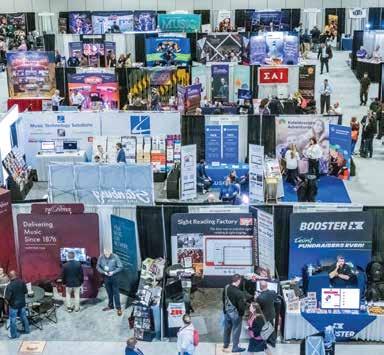
Please register and pay your deposit as soon as possible. We are assigning booth space in the order deposits are paid.

Ballroom = BR
Meeting Room = MR
Tampa Convention Center = TCC
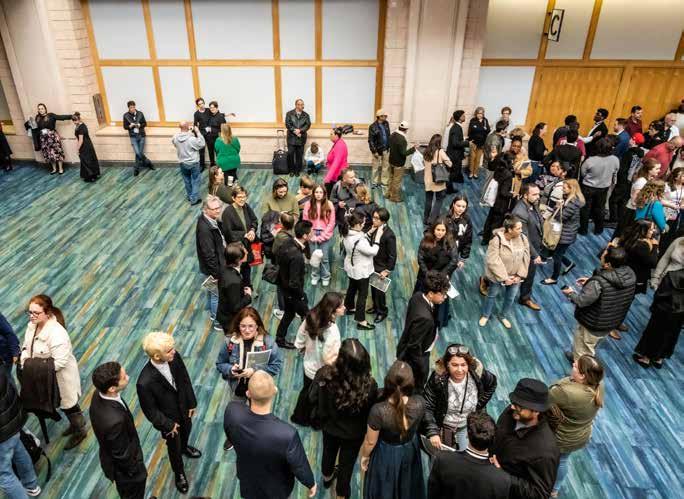
Marriott Water Street = MWS
RESEATING AUDITIONS
Hotel Tampa Riverwalk, Riverwalk BR
Thursday 9am-11am
REHEARSALS
Hotel Tampa Riverwalk, Riverwalk BR
Thursday 1pm-5pm
Thursday ..................................... 7pm-9:30pm
Friday .................................... 8:30am-11:30am
Friday 1pm-5pm
Saturday 9am-12noon
CONCERT – TCC, BR A
Saturday, January 13, 2024 2:30pm
REHEARSALS – MWS, Grand BR
Thursday 8am-11:30am
Thursday 1:30pm-4:30pm
Thursday 6:30pm-9pm
Friday 8:30am-11:30am
Friday 1:30pm-4pm
CONCERT – TCC, BR A
Saturday, January 13, 2024 ................... 11am
RESEATING AUDITIONS
MWS, Florida BR, Salons 5-6
Thursday 8am-11:30am
REHEARSALS
MWS, Florida BR, Salons 5-6

Thursday 7:30am-8am
Thursday ..................................... 9am-9:30am
Thursday ............................... 9:30am-11:30am
Thursday 1pm-5pm
Thursday 7pm-9pm
Friday 8:30am-11:30am
Friday 1pm-5pm
CONCERT – TCC, BR A
Saturday, January 13, 2024 ............... 6:30pm
REHEARSALS – TCC, Room 114
Wednesday 12noon-1pm
Wednesday 1pm-6pm
Thursday ...............................7:45am-12:45pm
CONCERT – TCC, BR A
Thursday, January 11, 2024 ............... 1:30pm
REHEARSALS – TCC
Thursday ....................10am-11am, West Hall A
Thursday 11am-6:20pm, West Hall A
Friday 8am-11:30am, Room 114
CONCERT – TCC, BR A
Friday, January 12, 2024 1pm
REHEARSALS – MWS & TCC
Tuesday (MWS, MR 8) 6pm-9pm
Wednesday (MWS, FL BR, Sal. 1-3) 8am-12noon
Wednesday (MWS, FL BR, Sal. 1-3) 1pm-5pm
Wednesday (MWS, FL BR, Sal. 1-3) ... 6pm-9pm
Thursday (TCC, Room 120) 8:30am-11:45am
CONCERT – TCC, Room 120
Thursday, January 11, 2024 12:30pm
REHEARSALS – TCC, Room 407
Wednesday 2pm-5:30pm
Wednesday 7pm-9pm
Thursday 8:30am-11:30am
Thursday .......................................... 1pm-5pm
Thursday ..................................... 7pm-9:30pm
Friday 8:30am-12noon
CONCERT – MWS, Grand BR
Friday, January 12, 2024 7pm
All-State Intercollegiate Band
REHEARSALS – Barrymore Hotel Tampa
Riverwalk, Crown BR
Thursday 8am-5pm
Thursday 6pm-9pm
Friday 8am-12noon
CONCERT – MWS, Grand BR
Friday, January 12, 2024 .................... 9:15pm
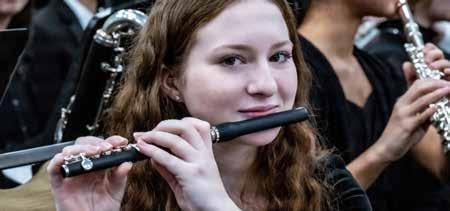
RESEATING AUDITIONS
Hilton Tampa Downtown, Palma Ceia BR
Thursday 9am-1am
REHEARSALS
Hilton Tampa Downtown, Palma Ceia BR
Thursday .......................................... 1pm-5pm
Thursday 7pm-9pm
Friday 8:30am-11:30am
Friday 2pm-5:30pm
Saturday 8:30am-12noon
CONCERT – TCC, BR A
Saturday, January 13, 2024 ............... 2:30pm
Jazz Band
REHEARSALS
Westin Tampa Waterside, Conch Room
Wednesday .................................. 2pm-5:30pm
Wednesday 7pm-9pm
Thursday 8:30am-11:30am
Thursday 1pm-5pm
Friday 8:30am-12noon
CONCERT – MWS, Grand BR
Friday, January 12, 2024 ......................... 7pm
Mixed Chorus
REHEARSALS – Hilton Tampa Downtown, Bayshore BR 1-3
Thursday 11am-1:30pm
Thursday 3pm-5pm
Thursday 6:30pm-8:30pm
Friday 8:45 am-11:30am
Friday 1pm-3pm
CONCERT – TCC, BR A
Friday, January 12, 2024 ......................... 7pm
RESEATING AUDITIONS – MWS, MR 8
Thursday ................. 7:30am-8am, Registration
Thursday 8am-11:30am
REHEARSALS – MWS, MR 8
Thursday 1pm-5pm
Thursday 7pm-9pm
Friday .................................... 8:30am-11:30am
Friday .............................................. 1pm-5pm
Saturday 10am-12noon
CONCERT – TCC, BR A
Saturday, January 13, 2024 6:30pm
Treble Chorus
REHEARSALS – Hilton Tampa Downtown, Bayshore BR 5-7
Thursday 10:30am-1:15pm
Thursday 2:45pm-4:45pm
Thursday ................................ 6:15pm-8:15pm
Friday .................................... 8:30am-11:15am
Friday 12:45pm-3:15pm
CONCERT – TCC, BR A
Friday, January 12, 2024 7pm
REHEARSAL – TCC, Room 403
Wednesday 8am-9pm
CONCERT – TCC, BR B
Thursday, January 11, 2024 ............... 4:15pm
REHEARSALS – Embassy Suites
Downtown, Gandy MR
Thursday 8am-11:30am
Thursday 1:30pm-4:30pm
Thursday 6:30pm-9pm
Friday .................................... 8:30am-11:30am
Friday .......................................... 1:30pm-4pm
Friday 4:30pm-5:30pm
CONCERT – TCC, BR A
Saturday, January 13, 2024 8:45 am
REHEARSALS – Westin Tampa Waterside, Oasis BR
Thursday 8am-11:30am
Thursday 1:30pm-4:30pm
Thursday 6:30pm-9pm
Friday .................................... 8:30am-11:30am
Friday ..................................... 1:30pm-4:30pm
CONCERT – TCC, BR A
Friday, January 12, 2024 9pm

RESEATING AUDITIONS – TCC, Room 122
Thursday 8:30am-10:30am
REHEARSALS – TCC, Room 122
Thursday 12:30pm-4:30pm
Thursday 6:30pm-9pm
Friday .................................... 8:30am-11:30am
Friday ............................................... 1pm-5pm
Saturday 9am-12noon
CONCERT – TCC, BR A
Saturday, January 13, 2024 2:30pm
continued
RESEATING AUDITIONS – TCC
Thursday, 8am-8:30am, Registration, Room 124
Thursday, 8:30am-11:30am, Rooms 103–107
REHEARSALS – TCC, Room 124
Thursday ............................... 8:30am-11:30am
Thursday 1pm-5pm
Thursday 7pm-9pm
Friday 8:30am-11:30am
Friday 1pm-5pm
Saturday .......................................... 9am-11am
CONCERT – TCC, BR A
Saturday, January 13, 2024 ............... 6:30pm
REHEARSALS – Embassy Suites
Downtown, Bayside BR
Thursday 8am-11:30am
Thursday 1:30pm-4:30pm
Thursday 6:30pm-9pm
Friday 8:30am-11:30am
Friday 1:30pm-4pm
CONCERT – TCC, BR A
Saturday, January 13, 2024 .............. 8:45 am
RESEATING AUDITIONS – Hotel Tampa
Riverwalk, Bayshore BR
Thursday ......................................... 9am-11am
REHEARSALS – Hotel Tampa Riverwalk, Bayshore BR
Thursday 1pm-5pm
Thursday 7pm-9:30pm
Friday 8:30am-11:30am
Friday ............................................... 1pm-5pm
CONCERT – MWS, Grand BR
Saturday, January 13, 2024 ................... 11am
Ballroom = BR
Meeting Room = MR
Tampa Convention Center = TCC
Marriott Water Street = MWS
REHEARSALS – Embassy Suites
Downtown, Skyway Room
Thursday 8am-8:30am, Registration
Thursday 8:30am-11:30am
Thursday 1pm-5pm
Thursday .......................................... 7pm-9pm
Friday .................................... 8:30am-11:30am
Friday 1pm-5pm
Saturday 9am-10:30am
CONCERT – MWS, Grand BR
Saturday, January 13, 2024 2:30pm
RESEATING AUDITIONS – Hilton Tampa
Downtown, Esplanade Suite
Thursday 9am-11am
REHEARSALS – Hilton Tampa Downtown, Esplanade Suite
Thursday 1pm-5pm
Thursday 7pm-9:30pm
Friday 8:30am-11:30am
Friday 1pm-5pm
CONCERT – MWS, Grand BR
Saturday, January 13, 2024 ................... 11am
REHEARSALS – Hotel Tampa Riverwalk, Riverview Room
Thursday ................. 8am-8:30am, Registration
Thursday 8:30am-11:30am
Thursday 1pm-5pm
Thursday 7pm-9pm
Friday 8:30am-11:30am
Friday 1pm-5pm
Saturday ..................................... 9am-10:30am
CONCERT – MWS, Grand BR
Saturday, January 13, 2024 ............... 2:30pm

Wednesday, January 10, 2024, 1pm-4:30pm Presenter: Fran Kick
KICK IT IN and TAKE THE LEAD!
This workshop is designed for all high school student leaders who want to learn, thrive, and become the best leader for their schools, peers, and themselves. Attendees will participate in active conversations and team and relationship building activities while also discovering their personal strengths and needs to continue to grow on their leadership journeys. Everyone will be engaged in a culture of inclusivity to see and hear all students while revealing the unique strengths and knowledge of our combined voices and experiences.
FMEA now offers two experiences for high school students who are not participating in an all-state ensemble, the Student Conference Experience and the Tri-M Conference Experience. Read the comparison here .
Includes a special leadership session with Fran Kick on
Thursday, January 11, 2024, 3pm-4pm
The purpose of the Florida Music Education Association Student Conference Experience is to expand access to the annual conference to students from throughout the state. Participating students will interact with amazing clinicians and educators, college representatives, and incredible performing groups. These students will have memorable experiences they can take back and share with their high school music programs. The program will take place on Thursday and Friday of the 2024 FMEA Professional Development Conference Students will participate in workshops, observe rehearsals, attend College Night, and engage in networking and social activities with their peers.
The purpose of the Florida Music Education Association Tri-M Conference Experience is to provide students with experiences that will build their leadership and advocacy skills, as well as expose them to the experiences available at the annual conference. Participating students will interact with amazing clinicians and educators, college representatives, and incredible performing groups. These students will have memorable experiences they can take back and share with their high school music programs.

TTo be granted a bachelor’s degree in music education in the state of Florida, preservice teachers (PSTs) must pass several Florida Teacher Certification Exams (FTCE) administered through the Florida Department of Education (FLDOE). Nearly all public and private colleges and universities in the state of Florida now hold requirements that students must pass all parts of the FTCE and all courses of a state-approved music education degree program to graduate with a Bachelor of Music Education, as state certification is tied to the music education degree program and diploma. There are few exceptions to these requirements, making it challenging for students to complete the state exams and coursework within a standard four years. Occasionally, these heavily loaded curriculums make it unclear as to what each student’s respective ideal graduation timeline should be, so planning is imperative. The purpose of this article is to provide a suggested timeline and to offer tips on preparing for the FTCE. Before reading any further, if you are a preservice music educator, please check to see if your specific degree program has deadlines for which these exams must be completed. Make note of these dates in places where you will be regularly reminded.
continued on page 32
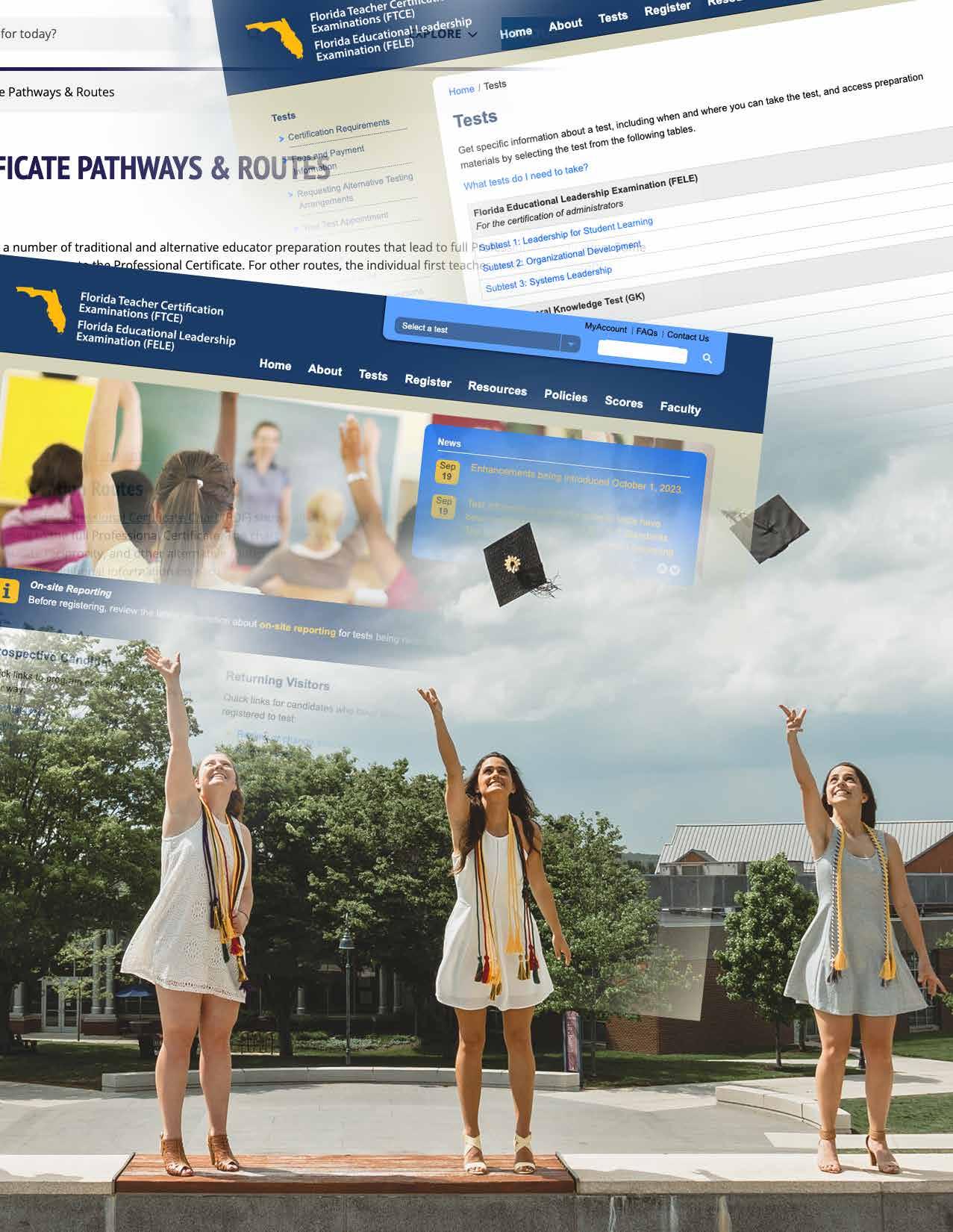
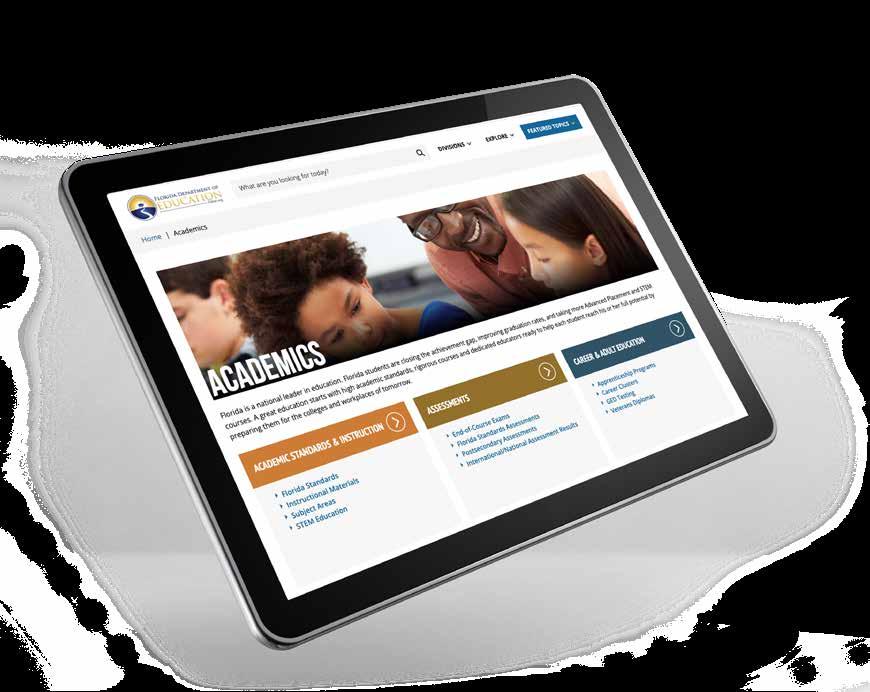
continued from page 30
Be prepared to budget not only your time, but money to take these exams. The series of exams within the FTCE are costly, so be aware of how much it costs to take them and what the financial consequences are if one fails to pass (as of June 2023, the FLDOE website quotes fees that total $375 for a first attempt at all three FTCE exams). If you are a student receiving financial aid, the higher education institutions can purchase vouchers from the FLDOE. Please check with your program coordinator, school of education, or financial aid office to see if you are eligible. If you require testing accommodations, be sure to gather your paperwork from your campus office of disabilities and be prepared to submit this documentation prior to taking the exams. Students requiring accommodations will have to request them and await approval. A link to
information about requesting alternative testing arrangements is in the resources table below.
State-approved music education programs throughout Florida have different curriculums and sequencing of courses. While this is beneficial to undergraduate preservice music educators, as it provides preferences in areas of concentration and coursework, it is unclear as to when to take the FTCE. Additionally, this can become more complex when one’s preservice music education program is bridged between multiple departments on campus (e.g., the department of music and the school of education). I have worked with undergraduate music education majors at two institutions in the state of Florida, one of which had a timeline and hard deadlines, and another where students had to pass their exams at their leisure but before graduation. Ideally, music education professors
and undergraduate program coordinators have suggested testing timelines in place for their students, and if so, students should follow them and regularly discuss their personal timeline with their campus or program advisor. However, if this timeline is not suggested within the institution, or perhaps the student is a transfer or a degree-holding individual (such as an associate degree), this article offers information on the content covered within each exam, suggestions as to when to take the state certification exams, and tips on how to prepare for them.
Timing is everything. One of the main purposes of this article is to encourage preservice teachers to create a timeline that allows room for minor adjustments. For anyone self-identifying as a procrastinator, it is essential you do not procrastinate taking the FTCE during your degree program. I have had students fail to meet exam deadlines, which, according to each respective undergraduate institution and program, can result in delay of student teaching, delay of graduation, or in some in cases, last-minute changes of major. Other consequences may result in obtaining a Florida Temporary Certificate, which is limiting and sometimes less marketable for job-seeking individuals.
Typically, there are three exams preservice music education students need to complete to obtain K-12 Florida Music Teacher Certification: the General Knowledge Test (GKT), the Subject Area Exam (SAE) in Music K-12, and the Professional Education Test (PED). I strongly advise against taking all the exams within the same semester, as one should study the practice exams and key concepts, theories, and skills prior to each respective test. Music education programs are intense and frequently require students to max out their credit load, or request for overload. This makes it difficult to add other studying or commitments to an already optimized schedule. Therefore, properly pacing and integrating these exams within one’s music education curriculum is critical. This allows preservice teachers time to take the exam shortly after they have taken the courses that have covered the content within the exam. Additionally, time is needed to learn and understand the test structure, time limitations, and question formats.
The GKT components include reading, mathematics, English language skills, and an essay. This exam is unique in that each component is scored separately and then combined into a cumulative score. If one fails one area of the GKT, one will only need to retake that component. The retake has a lesser exam fee than paying for the test in full, as one does on first attempt; however, the goal should still be to pass the entire exam in one effort. The GKT covers content and skills from students’ institutional core curriculum. I recommend students take the GTK during their sophomore year or the summer before junior year. Students who have obtained an associate degree or have completed a successful two years of full-time general coursework and are transferring into a BME program can also consider taking the GKT upon transfer or within their first semester as a preservice teacher. Students who graduated high school from a dual enrollment program or with an International Baccalaureate diploma, the Cambridge Advanced International Certificate of Education, or a similar diploma with a significant amount of college credit hours are likely prepared to pass the GKT by the end of their first full year of an undergraduate music education program.
The music (K-12) SAE exam covers several competencies related to fundamental music skills and music education theory and practice. The music SAE assesses one’s knowledge of music obtained through the general undergraduate music curriculum, such as music theory, history, and literature. Some questions will likely be contextualized specifically to choral, instrumental, and general music. This exam should be taken after you have completed the core music curriculum and during the last semester of the core music education methods courses. For example, my students have had success passing this exam during the spring or summer before their senior year, after finishing most techniques courses and one of their general music methods courses. Assuming associate degree-holding transfer students had a strong core music curriculum at their previous institution, they should aim to complete at least three semesters of their music education degree program coursework before attempting the Music (K-12) SAE.
continued on page 34

continued from page 33
According to my students, the Professional Education Test is the most difficult exam of the three, due to the abundance of content included in the competencies and the structure of the questions. This exam will likely require the most preparation and should not be taken without studying both content and exam strategies. There are eight competencies covered within this exam, yet many of the questions come from one’s knowledge of instructional design and planning, student-centered learning environments, instructional delivery, and assessment strategies. Be sure to know significant psychological and educational theories and related theorists, key teaching strategies within general classroom environments, and how they may be implemented. The bulk of the exam tests one’s knowledge of planning, assessment, instructional strategies, and professional resources. Additionally, other questions will cover professional ethical considerations, pedagogy specifically geared toward English language learners, and effective cross-curricular literacy strategies. It is important to familiarize yourself with differentiation strategies, approaches to working with exceptional learners, and related documentation and accessibility resources. This exam should be taken after most education classes are successfully completed, preferably the summer prior to the last semester on campus before the student teaching internship. In the event you don’t pass the first time, allowing one semester on campus for retakes will give you some flexibility and time to study and take the exam again.
The FTCE exam format and questions are structured similarly to the SAT or ACT, and there is often a specific technique to approach answering the questions within standardized exams that will allow for better success. I often recommend my students seek out instructional videos online on how to strengthen their test-taking skills, such as pacing, how to recognize trick questions, how to eliminate answers, etc. The types of questions used are very similar, if not the same across all standardized exams, so taking time to analyze and understand each of these types of questions is a key strategy and can play a significant role in helping students pass the exam in one attempt. You can find the types of questions to expect
within the exam under the exam description on the FTCE website.
There are formal practice programs that can be purchased for a fee. Occasionally, college or university tutoring centers, schools of education, or music education programs will have a subscription, and you should contact these departments for availability and access at a discounted rate. These usually have the most up-to-date test materials and practice questions. Since the structure and content of test questions are updated regularly, be sure to have the latest edition of any practice exams. Free samples of practice questions and exams are offered through the FLDOE FTCE website.
Know the competencies covered within each of the exams. This will help outline what topics to review and may alert you to what needs review. These competencies are embedded within your coursework and are often outlined in your syllabi within music education and school of education coursework. You should be able to cross-reference them through your syllabi and easily find the content needed to review. This is particularly useful if you took foundations or methods and pedagogy courses as a firstor second-year undergraduate music education major.
If you feel you need review of the theories, teaching strategies, and terminology assessed within these exams, there are flashcards and practice workbooks you can purchase. More interactive resources are available online through platforms like Kahoot! and Quizlet, which can be found through a simple search engine. I encourage you to make your own resources on one of these sites that works best for you and share it with others. Through creating your own, you are able to deepen your knowledge of the content and then use it as a resource for later review.
If you weren’t successful in passing an exam, immediately figure out when you can take it again and schedule that exam. It is possible to adjust the test date at a later time, but it is best to reserve your spot, particularly if you have a deadline to meet. When you receive your official score report, it lists the sections of the exam—or competencies— where you lost the most points. Take this information and plan out time to study the concepts, theories, or skills, and complete practice questions related to these competencies. Don’t become discouraged! You will not receive
Florida Department of Education General Information
https://www.fldoe.org/
Information on FTCE Exams
http://www.fl.nesinc.com/tests.asp
Other FLDOE Testing and Resources

http://www.fl.nesinc.com/
FTCE Registration
http://www.fl.nesinc.com/FL_Register.asp
FTCE Competencies and Skills, 27th Edition
FTCE Competencies and Skills, 27th Edition
Testing Accommodation Information
http://www.fl.nesinc.com/FL_AltArrangements.asp
Certification Pathways (excellent resource for those seeking certification without a degree in music education)
https://www.fldoe.org/teaching/certification/pathways-routes/
the same questions, as there are hundreds of questions from which the test questions are randomly pulled for each individually administered exam; however, some of the same material may be reworded into a different type of question that you will be better able to understand and answer with confidence and success. Most study guides will show you what competencies are covered within each test question, and you can narrow your study focus to these areas. Once again, review test-taking strategies. If you missed passing by only a few points, it is possible that you misinterpreted some questions or struggled to delimit multiple choice answers.
Florida is known for quality higher education institutions and top music programs that draw students from across the country. If you are planning to teach in another state, please consider completing all parts of the FTCE before starting the final year of your degree program. This will allow you to make the appropriate phone calls to other states’ departments of education and prepare to transfer your Florida Teaching Certification. Certification is unique to each state and becomes more complex when states use other performance-based assessment platforms governed by an external organization, such as edTPA or the Praxis. Conversations with knowledgeable people within the state department of education and gathering documentation will need to take place to determine certi-
fication reciprocity, which takes time and resources. You do not want the stress of preparing for exams, completing your student teaching internship, interviewing for jobs, and preparing a transfer of teaching certification all at the same time!
For further reading on exam preparation, particularly in other states, see the recent article “Show What You Know: Assessment Tips for Collegiate Students” in NAfME’s publication, Teaching Music (Kick et al., 2023). This article provides further test-taking tips and information regarding teacher assessment platforms such as edTPA, PPAT, and the Praxis. For more information on the exams and preparation tips discussed within this article, see the FTCE Testing Resource Table for Preservice Music Educators.
Margaret Flood is an assistant professor of music and the coordinator of music education at Florida Southern College where she teaches elementary and secondary methods, woodwind and brass pedagogy, intern seminar, and supervises all music education interns. She holds the PhD in music education from the University of Miami.
Reference Kick, F. et al. (2023). Show what you know: Assessment tips for collegiate students. Teaching Music, 30(4), 50–53.
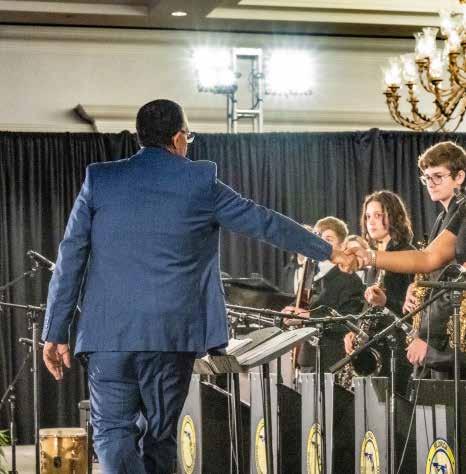
It was Debussy who said “Music is in the space between the notes” (Koomey, 2001, p. 96). I believe the same concept applies to teaching. Sometimes it’s not the things we say, but the things we do. Sometimes it’s not the things we do, but the things we don’t. Because of this, it is imperative that we are aware of not only our purposeful actions, but also our passive actions. It just might be that the moments we spend off the podium speak louder than those on the podium.
My high school band director was a phenomenal musician, educator, and successful woman who demanded respect and obedience. She held high expectations with an unwavering authority. One of her rules, which no one dared break, was never to walk in front of the ensemble or behind her while she was conducting. She was not known to pause a rehearsal for anyone or anything. That was until one of my close friends walked through the door, late to class, returning from a several-weeks’ stay at the hospital. My band director immediately stepped off the podium and ran over to embrace this student without even cutting off the ensemble. The room was silent enough to hear a pin drop, and we were filled with shock to see this uncharacteristic behavior of our band director. Our shock was quickly replaced by awe as we witnessed and understood the compassion our band director had for us.
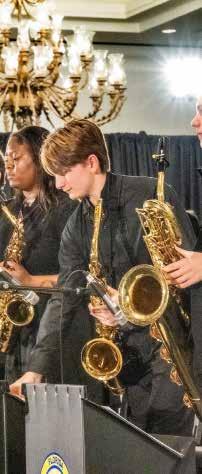
When I look back on my past and ask myself why I chose this path of music education, this memory is always one to pop up. What I witnessed was a deep compassion and affection for others, which taught and inspired me to do the same. One of the largest contributors to my pursuit of music education was something that happened in between the music, off the podium, and outside of teaching. There is so much to teaching music, and it’s not limited to just the music.
continued on page 38
continued from page 37
Non-musical objectives are taught by all of us, some deliberately and some passively. Many of these will be directly impacted by our personal values and the culture we establish in our programs. Typically when we think of establishing culture in our programs, we think of things such as teaching students to follow the rules, show up on time, and show each other respect. We build culture by enforcing rules, setting expectations, and maintaining a teacher persona; however, creating space and time for student interactions and cultural growth may lead to even more effective rehearsals and further commitment from our students. Previous research observed experienced teachers taking breaks of longer duration and at a higher frequency than both novice and preservice teachers (Goolsby, 1996). When questioned about their use of breaks, effective teachers indicated that “unison offtask behavior” reduced classroom management problems during productive rehearsal time. Furthermore, allowing students to relax encouraged social interaction and revitalized classroom engagement.
A similar study by Vepraskas (2002) recorded the effects of hydration on student health in marching band rehearsals. When implementing regular and frequent water breaks, both marching band students and directors reported more effective rehearsals as well as a more positive outlook on their experience. As teachers, we typically prioritize high engagement, on-task behavior, and fast pacing. These data suggest that taking time to slow down and allow for “unison off-task behavior” improves rehearsal and teacher effectiveness.
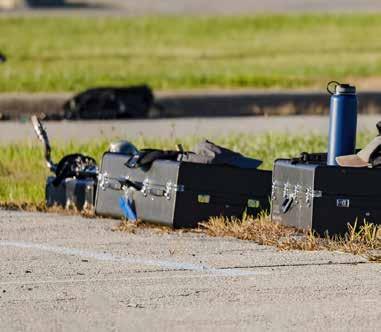
Research indicates that music classes “build character, provide an emotional outlet, and help socially”
(Adderly, Kennedy, & Berz, 2003). These data, coupled with research observing the presence of student interaction in breaks and its effects on learning, suggest that some aspects of the culture we develop within our programs are largely created during time spent away from classroom activities.
Taking deliberate breaks creates the space and time needed for students to develop socially. It also allows the teacher to control these moments of “unison off-task behavior,” which contributes to effective classroom management. To offer you a perspective of what these “deliberate breaks” may look like, I will share two experiences of my own. The first I experienced in my time as a student,
and the second is an annual activity I implemented with my high school choir.
It was approaching the end of the semester in eighth grade geography. Mr. T (name withheld) told us we wouldn’t need the textbook today. Instead, he walked around the class and handed everyone a tie. He proceeded to tell us we would learn how to tie a tie today and have a test on it tomorrow. Mr. T then began teaching us how to tie a tie whilst modeling his own. It didn’t take long before he was interrupted by a slew of comments and questions. “This isn’t geography. Why are we learning to tie a tie? Why do I have to know how to tie a tie?” Mr. T responded with a question, asking us if everyone knew how to tie a tie. If not, then there was clearly something to be learned. To those who expressed their concern with why we had to tie a tie, he asked, “What are the chances you will have a son or a significant other who will need to tie a tie?” Silence began to sweep across the room. Mr. T spoke up again and shared with us that not everyone grows up with a father, not everyone grows up with a parental figure who will share the moment of tying their first tie with them and preparing them for the professional world. Even if it was only one student for whom he was able to create this experience, then this lesson was important.
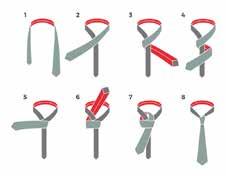
I don’t remember much from my eighth grade geography class, but I remember this experience. Because of it, I had a deepened respect for Mr. T, as did the rest of the class. He got us to buy in to his teaching. Whether or not it was in the subject area, we all wanted to listen to his teaching.
During my time teaching high school choir, I recognized that my beginning choir, which consisted mostly of students with no previous choral experience, struggled to sing in front of one another at the beginning of the year. This would lead to problems with support, straining, and other issues. I knew I needed to find a way to build comfort with my students. Pondering the subject while driving home from work one day, I recognized the parallels between effective music-making and relationships. Specifically, to experience music, to feel the music, to create the music, we must open ourselves up to be impacted by the music. Doing this requires us to be vulnerable. Similarly, strong relationships/friendships have one thing in common, trust. To trust someone, you must give them some power over you but trust they will not use it. This kind of trust requires vulnerability.
One class period after the first month of school, once the students were beginning to know one another, I would clear everything to the sides of the room. When students walked in, I directed them to sit down in a circle so we could all see one another. I began by asking them, “What’s the difference between a stranger and a close friend?” This would lead us down a path of conversation that always involved responses like “experiences,” “emotions,” and “the difference between friends and close friends is vulnerability.” I would ask, “If we expect to feel
emotion from music, how can we do that without being vulnerable?” Thus, music required vulnerability. I asked the students to define vulnerability and if anyone would share a vulnerable experience of their own. Each year, there would be a long pause before one person would share. All it took was one to get the ball rolling. For the remainder of the class, I would allow the students to share experiences and grow to know each other. Every year, the rehearsal following this sharing session was startling. The choir was unrecognizable as the students were now comfortable to sing with one another. It transformed our sound, musicality, and the entire culture of the program.
I shared these two stories with you not as a recipe or a model to be replicated, but as inspiration and evidence. If we want to build a strong music program, our programs must be strong musically and socially. To do this we must be effective teachers, but we must also facilitate culture. We’ve all heard it said that “teachers aren’t just teachers.”
We fill many roles: banker, leader, counselor, librarian, travel agent, custodian, etc. Sometimes this may require us to take a break and step away from the music. By being deliberate in these moments we can facilitate the cultural, social, academic, and musical growth of our ensembles. Music education isn’t just what happens in rehearsals, but what happens in between.
Collin Clark recently graduated with the MME and is pursuing the PhD in music education at Florida State University. Before graduate school he taught music including, band, choir, piano, and guitar at Bishop Kenny High School in Jacksonville, Florida.

Adderley, C., Kennedy, M., & Berz, W. (2003). “A Home Away From Home”: The World of The High School Music Classroom. Journal of Research in Music Education, 51(3), 190–205. https://doi. org/10.2307/3345373
Goolsby, T. W. (1996). Time Use in Instrumental Rehearsals: A Comparison of Experienced, Novice, and Student Teachers. Journal of Research in Music Education, 44(4), 286–303. https:// doi.org/10.2307/3345442
Koomey, J. (2017). Turning numbers into knowledge: Mastering the art of Problem Solving. Analytics Press.
Vepraskas, C. (2002). Beat the Heat: Managing Heat and Hydration In Marching Band. The Journal of School Nursing, 18(4), 237–243. https://doi.org/10.1177/10598405020180042001
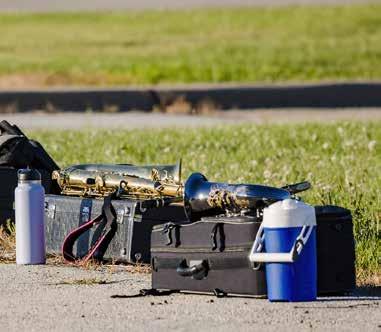
Thank you to all of the donors who have shown their dedication to the improvement of music education in Florida by supporting our Mission through financial contributions.
Our donors support specific causes by donating to the FMEA funds of their choice:
FMEA Scholarship Fund
Music Education Advocacy General Fund
June M. Hinckley Scholarship
Professional Development for Members
Mel & Sally Schiff Music Education Relief Fund
The following have graciously donated to FMEA from April 1, 2023, through September 7, 2023.
$10,000 and up
No current donors at this time.
$100 – $999
Carlos Abril
In Honor of Dr. Joyce Jordan
Lucinda Balistreri
Virginia Densmore
In Honor of Dr. Shelby Chipman
Virginia Dickert
In Memory of Lindsay Wells, Teri Wester, & Debbie Liles
Michael Dye
In Honor of Mark & Brenda Scott for their lifetime dedication to Florida vocal music education
Rita Hersom
In Memory of Billy Bryant, Jr.
Sheila King
In Memory of John W. King
Kevin Lusk
Brenda McGlohon Mitchell
In Memory of Dorothy Wells Skinner
John Nista
On Behalf of Stanley Dmitrenko
David Pletincks
In Honor of Alexis & Jonnie Pletincks
Jeanne Reynolds
In Honor of Pinellas County Performing Arts Teachers
$1,000 – $9,999
Clifford Madsen
Russell Robinson
Mary Catherine Salo
In Memory of Gary Rivenbark & Wes Rainer
Steven Salo
In Honor of Dr. William Prince & John “Buck” Jamison
Kathleen Sanz
In Memory of June Hinckley
J. Mark Scott
In Dedication to Dr. Andre Thomas, Dr. Judy Arthur, Dr. Judy Bowers, & Jason Locker
D. Gregory Springer
Harry Spyker
In Honor of Fred & Marlene Miller
Jeannine Stemmer
In Memory of Barbara Kingman & Lauren Alonso
Leiland Theriot
Richard Uhler
David Verdoni
Howard Weinstein
In Memory of Barry Weinstein
Doris Elaine Wells
In Memory of Dorothy Wells Skinner
$25 – $99
Judy Arthur
Gale Baker
In Memory of William Bryant, Jr.
Garza Baldwin
In Memory of Dorothy Wells Skinner
David Bayardelle
In Honor of Harry Spyker
Melanie Brown
In Memory of Dorothy Skinner
Jamie Bryan
Kasia Bugaj
Stanley Butts
Greg Carswell
On Behalf of all the Florida choral directors who have passed on Jeff Cayer
Dayna Cole
In Memory of Linda Mann
Bradley Franks
In Memory of Gary W. Rivenbark
Anna Marie Friars
In Memory of Matthew McLaughlin
up to $24
Michael Belyea
Crystal Berner
Jodie Donahoo
Christopher Dunn
Debbie Fahmie
Tina Gill
In Memory of Gary Rivenbark
Angela Hartvigsen
William Hazlett
Llewellyn Humphrey
Kathleen James
Sandra Geres
In Memory of Dorothy Wells Skinner
Cynthia Heidel
Alexis Hobbs
Martha Huntley
In Memory of Dorothy Skinner, Safety Harbor, FL
Mary Keyloun Cruz
In Memory of George Keyloun & Pauline Antaki
Cynthia Kohanek
Joseph Luechauer
Deborah Mar
In Memory of Barbara Kingman
Matthew McCutchen
In Honor of John Carmichael
Victor Mongillo
Daniel Murphy
In Memory of Billy Bryant
Stephen Nelson
Justin Plante
Edward Prasse
Marie Radloff
Clinton Randles
Melissa Rawls
In Honor of Nancy Bartels
C. William Renfroe
In Memory of James O. Johnston & Herbert Beam
William Rose
Eddie Steadman
Mark Stevens
In Honor of Dr. Clifford Madsen
Valerie Terry
Kathleen Thompson
Ellen Turko
In Memory of Billy Bryant
Elizabeth Weir
Sondra Wenninger Collins
Anonymous (4)
On Behalf of Derek Schaumann’s Birthday
Jason Jerald
Marsha Kindall-Smith
Pauline Latorre
Lu Anne Leone
Gerald Madrinan P. L. Malcolm
John Marshall
Khemya Mitrahina
Mary Palmer
Hank Phillips
Alexandra Rameau
Ian Schwindt
John Southall
Kelly Southall
Phil Tempkins
In Memory of Susan McCray
Lindsey Williams
Anonymous (9) In Memory of William Bryant, Jr.
 William I. Bauer, PhD FMEA Research Committee Chairperson, University of Florida
William I. Bauer, PhD FMEA Research Committee Chairperson, University of Florida

This on-going column seeks to stimulate awareness of research issues for FMEA teachers and researchers.
Anessential element of every classroom is its learning environment, which includes the physical, social, and psychological setting where students receive formal instruction, participate in educational activities, and interact with both peers and educators. It encompasses the entire space and atmosphere within a classroom, including the physical layout, resources, instructional strategies, and interpersonal dynamics that influence the teaching and learning process and the students’ educational experiences and outcomes.
Sara E. Marino and Clark A. Chinn (2023) investigated the success of a specific learning environment designed for middle school instrumentalists who were learning to improvise. The learning environment they studied included four essential features:
1. Students were placed in cooperative jazz combos, an authentic setting for improvisation.
2. During instruction, the teacher externalized her thinking to students. She “made musical elements characteristic of jazz and improvisation strategies explicit; guided students through identifying, articulating, and exploring them; provided cognitive and motivational scaffolds; modeled; and coached” (p. 4). These processes align with cognitive apprenticeship models (e.g., see Collins, 2006).
3. Students were provided with specific feedback by the teacher. They also learned to provide feedback to themselves by self-assessing their improvised solos. Both types of feedback were designed to contribute to the students’ self-efficacy for improvisation.
4. Harmonic form sequencing was used. Two 12-bar blues tunes and two modal tunes in 32-bar song form from the standard jazz repertoire comprised the musical content for improvisation. These developmentally appropriate tunes were chosen to (a) appropriately challenge students, (b) motivate learning, and (c) provide an authentic context for improvisation.
Over a period of 12 weeks, 43 students in grades 5-8 engaged in weekly 45-minute classes on improvisation that were taught in the learning environment described above. The students were divided into two groups: Group A studied the modal tunes during weeks 1-6, then the blues in weeks 7-12; Group B worked on the tunes in the opposite order. Members of the two larger (A and B) groups were then assigned to one of six combos.
Data was collected at three points: a pretest, a midtest (halfway through the study), and a posttest. During the pretest, students completed the Advanced Measures of Music Audiation (AMMA) (Gordon, 1992) to assess their music aptitude. Students also provided demographic and background information that included their (a) school ensemble experience, (b) jazz ensemble experience, (c) jazz improvisation experience, (d) grade level, (e) gender, (f) instrument family, and (g) whether they took private lessons outside of school. Students also recorded themselves playing an improvisation over the chord changes of the blues and modal tunes, which was evaluated by three expert judges using the Jazz Improvisation Performance Achievement Measure (JIPAM) (Watson, 2010). Students also self-assessed their improvisation using a single 7-point Likert-type scale item that asked them to “Please self-assess the improvised jazz solo you just played.” Finally, students completed questionnaires that measured their self-efficacy—Jazz Improvisation SelfEfficacy Measure (JISEM) (Watson, 2010), and motivation—Jazz Improvisation Motivation Measure (JIMM) (adapted from Lepper et al., 2005).
Following the pretest, the students received six weeks of instruction, with Group A studying the modal tunes and Group B working on the 12-bar blues tunes. At the midpoint of the study, students recorded themselves improvising again, which was assessed by the expert judges using the JIPAM. The students also self-assessed their improvisation using the 7-point Likert-type scale. Finally, the self-efficacy and
motivation questionnaires were administered again. The midpoint assessment was followed by six more weeks of instruction, with Group A concentrating on the 12-bar blues and Group B focusing on the modal tunes. At the end of week 12, the same data as at the midpoint of the study was once more collected.
Key findings included the following:
1. Scores on all measurements (improvisation achievement, self-efficacy, and motivation) improved significantly over the course of the study (pretest to midtest to posttest), and it seemed like participants could apply what they learned in one musical context to another (e.g., students who first studied the 12-bar blues appeared to be able to transfer what they learned working on that repertoire to the modal tunes).
2. There were no significant differences in the outcome measurements between Group A and Group B. The order of study (blues then modal, or vice versa) did not matter.
3. Students who had certain demographic characteristics had higher achievement gains. Those individuals with greater experience in a school ensemble and/or jazz ensemble had higher achievement gains, as did students with some previous improvisation experience. Eighth-grade students showed the largest improvements in achievement. Both students with high and low music aptitude made better progress than those with average music aptitude.
Creating effective learning environments is crucial, especially for subjects like jazz improvisation. The findings of Marino and Chinn (2023) suggest that middle school music teachers, and educators in similar settings where students are new to jazz improvisation, should consider the four key features of
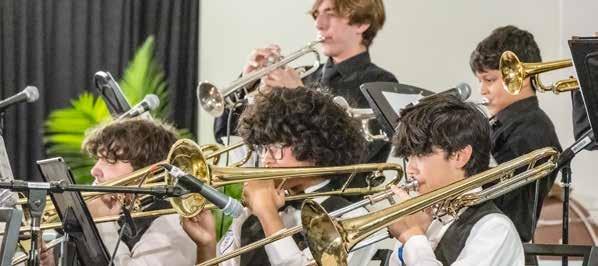
an effective learning environment that have been identified by the researchers. By incorporating these elements into their teaching approach, teachers can potentially enhance students’ jazz improvisation skills, boost their confidence in this art form, and foster greater interest in it. Music educators appear to have the flexibility to choose different harmonic forms (i.e., modal tunes or 12-bar blues) to use with beginning improvisation students as both types of repertoire seem to yield positive results in facilitating valued learning outcomes. By prioritizing the elements that contribute to a successful learning environment for jazz improvisation, music teachers can empower young musicians to develop self-efficacy as improvisers. This, in turn, can motivate them to delve deeper into this essential aspect of their musical journey.
References
Collins, A. (2006). Cognitive apprenticeship. In R. K. Sawyer (Ed.), The Cambridge handbook of the learning sciences (pp. 47–60). Cambridge University Press.
Gordon, E. (1992). Advanced measures of music audiation. GIA Publications.
Lepper, M. R., Corpus, J. H., & Iyengar, S. S. (2005). Intrinsic and extrinsic motivational orientations in the classroom: Age differences and academic correlates. Journal of Educational Psychology, 97(2), 184–196. https://doi.org/10.1037/00220663.97.2.184

Marino, S. E., & Chin, C. A. (2023). Jazz improvisation pedagogy: Evaluating the effectiveness of a beginning jazz improvisation learning environment for middle school instrumentalists. Journal of Research in Music Education, Advance online publication. https://doi.org/10.1177/00224294221150019
Watson, K. E. (2010). The effects of aural versus notated instructional materials on achievement and self-efficacy in jazz improvisation. Journal of Research in Music Education, 58(3), 240–259. https://doi. org/10.1177/0022429410377115

It’sOctober and high school folks are just about marching MPA ready or marching band burnt out! All of our middle school beginners should have instruments by now, and the sev enth graders still can’t quite figure out the correct way to put on their ligature. But we are here and life is great, as is music education in your corner of the state. In all seriousness,
 Bernard (Bernie) Hendricks, Jr. President
Bernard (Bernie) Hendricks, Jr. President

let me take you back to 1997, my first year teaching (as a middle school band director) and my wonderful first October in education. It was the month when I felt like I was absolutely on an island by myself and had no idea what or why I was teaching band. It was a tough time, and I was probably about two or three days
By the time you’re reading this article, you are already completely engrossed in the fall semester. All-state auditions are in full swing with one more round to go. Fall concerts are on the immediate horizon, if you haven’t already done one. At the end of August, when I was writing this article, I was amazed at how life got really busy, really fast. Don’t let yourself get overwhelmed.
We are hearing more and more about the importance of self-care, physically, mentally, and emotionally. We owe it to ourselves, and our students, to be aware of how we are doing with work-life balance. If this is already a struggle for you, here are a few suggestions to help find a healthier balance.

Prioritize your workload. You are going to have periods of time where it seems everything is piling up, and you just can’t do it all in one day. Be conscious of your deadlines, and attack the most pressing items first.
Leave your work at school. I started doing this years ago because I wanted to be more present for my family in the evenings. It’s not always possible. Sometimes you have too much that has to be done. Try working through your planning period and lunch from bell to bell, getting as much done as possible to avoid taking it home. Consider spending an extra 30 minutes at school finishing something up as opposed to
from packing it all in and taking back my job at Domino’s Pizza on Capital Circle in Tallahassee. (In 1997 I was making way more money at Domino’s than I was teaching!)

But one day as I was sitting at my desk after school, I heard a knock on the back door of the band room. I opened it to see a fellow (much more experienced) band director with a smile on his face. First words out of his mouth were, “Hey, let’s go grab a bite to eat and have an adult beverage!” So we did. And that actually
taking it home and having to get refocused.
Set aside time for the activities that allow you to unwind mentally. It is critical that you take time to do whatever it is that gives you the opportunity to feel refreshed. Don’t let yourself feel like all you do is work, eat, and sleep.
Spend time with loved ones. A dear friend of mine told me something when my first child was born. He said, “No one has ever said on their deathbed, ‘My only regret in life is I spent too much time with my kids.’” Make time for the people in your life you love the most. If you don’t have family nearby, spend time with special friends. It thrills me to see photos of families traveling or camping and to see friends getting together, investing time in each other. For my family, a day at Disney or a trip to the mountains in Tennessee were always our most cherished times together.
Your teaching position does not define you. Being a music educator is a fraction of what makes you who you are. Be the best you can be and find contentment in that. Please take care of yourselves, and have a wonderful, healthy fall semester.
saved my job and career as a music educator. Yes, we talked about some band and classroom stuff, but more importantly, we talked about a ton of stuff unrelated to band/music education and more related to us as human beings.
I think all of you know that as your president I’ve put a lot of focus on taking care of ourselves as the people we are and not as much focus on what we are doing on the podium. I’m not changing course because I still believe the better we are to ourselves, the better we will be to our students and ultimately to each other. So, I will continue to push forward the theme Building Better Bands, Through Camaraderie, Community, and Creativity. Now is a great time to connect with a fellow educator to check in and make sure we are all doing well. We’ll get back to our What’s Up Wednesdays, and the Hi-Five Focus group will become active again. We will continue to celebrate the success of our directors and our band programs with a fall version of the Spring Spotlight. And this school year has brought us a new platform of knowledge and band support from our FBA Retired Directors Committee. Retired directors are ready and willing to come in and support us in our daily activities. More information will be coming from your district leadership.
We are a much more effective community together than as individuals, so I encourage you to be open to having colleagues in your classroom and to getting out into others’ classrooms.
I am looking forward to seeing everyone at our FBA Hall of Fame Weekend in November. There is more information on the FBA website: fba.flmusiced.org.
The committee has been working diligently to offer a mentoring option to our members on the FOA website. If you are willing to be contacted as a mentor or would like a mentor, please CLICK HERE. This will help our members to reach out to those who can assist them. We are all in this together!
Knowing it is time to reevaluate our current concert MPA sheets, the committee has put together a SURVEY asking for the membership’s thoughts. Please take a moment to fill out this survey to give the committee comprehensive feedback. The deadline to complete the survey is October 6, 2023. The committee will review your comments and share them at our next executive board meeting. Thank you for taking the time to share your suggestions. Your input allows us to better serve our community.
Earlier this year, district chairpersons were sent a link for a Google form to recognize members in their district who are Rising Stars. This is a new award for our members to be recognized for their efforts. Here are the criteria for nominations:
w FOA member and current orchestra director in Florida
w The nominee is teaching at the same school the year they were nominated
w Regularly participates in district/state meetings and events
w Demonstrates maintenance, significant growth, or establishment of their program Nominations are to be submitted by your district chairperson. If you know of a deserving individual, please let your district chairperson know.
Also, don’t forget to nominate individuals deserving of the HALL OF FAME AWARD. Think of all the educators who have inspired YOU and consider nominating them for this prestigious honor.

Thanks to the Awards Committee and your president-elect, we will be presenting to you a quarterly FOA newsletter. It is our hope it will provide you with another resource to stay informed of all the great things FOA is doing for you.
Don’t forget to register for the FOA/FLASTA Fall Professional Development Conference, October 12-13, 2023, at the Hilton Orlando. This is another opportunity for educational growth, networking, and more importantly, fun! We are privileged to have Dr. Rebecca MacLeod as our keynote speaker and have many exciting sessions planned. Register now on our FOA website (myfoa.org ). Final all-state selection will be held on October 14, 2023, at the Hilton Orlando. If you would like to be part of this important process, be sure to contact your district chairperson.
I am excited about the many great things our executive board members are doing for you. Please check out the links above. It is the mission of the Executive Committee and Executive Board to serve you. Please let us know if there is anything we can do to help.
Here are some of the ways
FOA is working for you:
ASSOCIATION
Nowis a great time to take a moment and assess the progress you’ve made toward achieving the personal, professional, and community goals you established back in August. Have you achieved any of them yet? If so, that’s great! Congratulations! What did you do to celebrate? Remember, “all work and no play …” leads to burnout! Treat your-
self to a movie night with friends, go sit on the beach or by a lake (watch out for gators) and read a book, or do whatever you really enjoy but feel you never have time to do. Celebrating your victories is an important part of that work-life balance you’re always hearing about. Are any of your goals looking especially unattainable? If so, take time to exam-

Burnout is a topic that many of us are all too familiar with. It is a feeling that students and teachers everywhere share, but why has it become so normalized? Why have we allowed ourselves to reach this point? Many external factors can lead to burnout, but it is vital, especially for us as students, to reflect on the impact our own choices have on our mental health. One of the hardest parts about being a music major is time management. We all know procrastination is not a viable habit. Even so, it took me two years to fully understand what time management really means for a college student.
I’ve always had a to-do list of items that I need to complete each day before I can enjoy my free time. My list helped me stay organized in high school, and I had no reason to believe it wouldn’t help me in college. To some extent, it did. From an outside perspective, I was thriving.
Suddenly, however, the workload became an infinite chasm, and I started spiraling. No matter how hard I worked, my to-do list was forever intensifying. My head felt full of static, and there was always something else to practice, another assignment to do. I became increasingly burnt out and was in desperate need of a break, but taking one would only make things worse. Eventually, I real-
Mark A. Belfast, Jr., PhD Advisorine why they seem so difficult to achieve and what adjustments you might need to make to ensure you continue progressing toward them. Remember, throughout history, all change (good or bad) has come as a result of conflict. That means we ought to expect hardship whenever we attempt something new. Steel yourself for the inevitable challenge that lies ahead as you
Colin Urbina President

ized how miserable I was. Too many college students have shared this same story. We put everything we have into our study and neglect our own needs until it is too late.
As music students, we must set boundaries for ourselves to preserve our mental health. We can always practice more, and we always feel slightly behind. It’s so easy for us to give up the last bit of free time we have to help out in another ensemble or to volunteer for an event. I wanted to help whenever I could, and I thought I was bettering myself by doing so. However, at some point, a break is necessary.
I know now that it is not worth it to sacrifice your mental well-being for school. Every single one of us has a unique reason for aspiring to teach the next generation of students. However, it is incredibly difficult to be an effective director with no passion, and it doesn’t help anyone to work to the point
We hear about work-life balance, but it’s hard to know when to actually stop working. Time management isn’t just about finishing assignments on time; it’s about ensuring you make time to take care of yourself. I still make to-do lists, but now they include my own needs, too. Take care of yourself, spend time with the people you love, and do what makes you happy. Work hard and love what you study, but don’t sacrifice yourself in the process.
continue to chisel away the rough spots and shape yourself into the person (and professional) you desire to become.
Often, we fail to achieve our goals and meet our potential because we are crippled by fear. Fear of the unknown, fear of embarrassment, and fear of failure can serve as roadblocks on our journey to a life of joy and fulfillment. I recognize it’s easy to simply say “fear not!” It’s exponentially more difficult to actually combat and overcome that fear. So, I’ll just remind you that you’re not on this journey alone. If fear is preventing you from achieving your goals, fight fear with friends! One of my mentors always said, “Show me your friends and I’ll show you your future.” Lean on your colleagues and friends in NAfME Collegiate when your goals seem out of your reach, and watch how those positive relationships energize you and enable you to persist. Additionally, evaluate why you set each goal in the first place. How will achieving it add value to your life or the life of others? If it won’t, perhaps it’s not a goal worth pursuing! I recently saw a quote by D.L. Moody that really hit home. He said, “Our greatest fear should not be of failure, but of succeeding at something that really doesn’t matter.” Let that marinate for a bit.
Finally, I hope one of your goals this semester is to attend our Fall Conference. Now is the time to make preparations for your trip to Orlando. Do you need encouragement? Are you out of fresh ideas? Would you like to develop or strengthen professional relationships with preservice and in-service music educators from around the state? The Florida NAfME Collegiate Fall Conference is designed specifically for you. I hope to see you at the University of Central Florida next month.
Now … go smash those goals!

 by Jessica Gronberg
by Jessica Gronberg
at an early age love learning, and with continued positive learning experiences they will exhibit excitement, curiosity, and engagement in learning. Participating in something as special as music can be life changing for a child. Every opportunity we can provide to our young musicians outside of our own classrooms to learn, to grow, to create, to perform, and to shine like the stars they are is a true joy, a blessing! FEMEA is so excited to be able to bring to our membership our new Rising Stars Program Workshop—sure to be an amazing day full of music and memories!
During this very special workshop, nominated third-grade students will be learning skills, tools, and foundational elements of music that will certainly help these Rising Stars as they prepare for future all-state auditions. Repertoire, lessons, and movement will be engaging and unique, full of fun and high energy, and will include beginning elements of essential music theory, vocal techniques for beautiful, healthy singing, proper vowel sounds, tone quality and breath support, and coordination skills through musicbased movement and choreography. This entire experience will culminate in an informal performance of what these Rising Stars have worked on throughout their day.
This will truly be a fun day of making music together! The purpose of this day is simply for everyone to have fun, learn more about singing and dancing, make friends, improve musicianship, gain confidence in the audition process, bring some of this energy and excitement back to their own music classrooms, and most importantly, discover a deeper love for music!
Please consider joining us Saturday, October 28, at the University of Florida. You can find more information about our Rising Stars program HERE. We hope to see you there!
Jessica Gronberg is the chairperson for FEMEA District 1. She started her 21st of teaching this fall and her fifth year at Hawkes Bluff Elementary School in Davie, Florida, where she was recognized as the 2023 Teacher of the Year. She was also recognized as both a 2023 and 2024 quarterfinalist for the GRAMMY Music Educator of the Year.

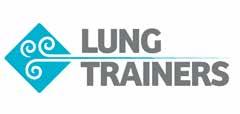





Please take time to thank and support our 2023-2024 Corporate Partners.

Amazing Student Tours
Head’s House of Music
Heartsong AV Services

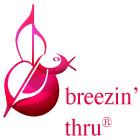
Music & Arts
Music is Elementary
Romeo Music
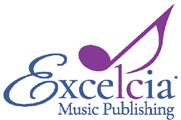
West Music Company
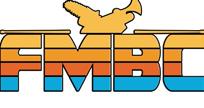

Lastmonth I asked readers to send their experiences to me so I can share them in the Florida Music Director. I am again asking you to send an email with a brief description (or longer) of ways you are reaching diverse learners in your school. Maybe you would prefer to call or video chat. In the end, I believe it is vital to share your experiences to help our community. In the meantime, I will share a question I received.
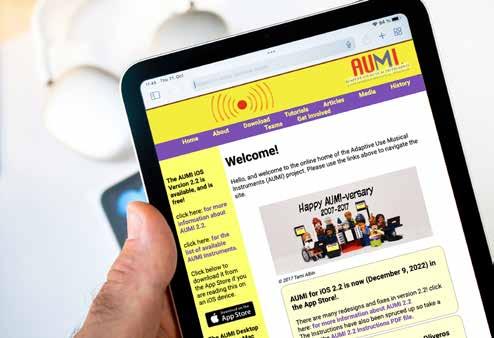
What would you include in a self-contained elementary, middle, or high school music class?
A few ideas:
1. Call and response songs naturally have an easy refrain. The simplicity of the response can offer success for novice musicians. The teacher or a more advanced musician can sing the call while everyone else sings the response. As many of our students struggle with verbal tasks, they can participate by playing a drum. If the response is simple enough, they can even play the melody on a pitched instrument. Think about a single resonator bell or removing bars
from Orff instruments. One of my favorite songs is “John the Rabbit.” The call is a sentence followed by a repeated onenote response.


I often change the words to fit the age level of the students. Sometimes I sing about other animals we encounter in our daily lives. As students mature, we can sing about sports cars or other age-appropriate motivators. “Hill and Gully Rider” is another one-note song to get them started on a musical journey.
2. Electronic instruments are cost effective and necessary for the physical abilities of some students. If a tablet or smartphone is available, there are easyto-play apps. See what is available on your platform. I recommend Thumbjam ($8.99), Garage Band Instruments (free on Apple devices), and Xylophone-Musical Muscles for students who use hands or limbs to control their device. Thumbjam allows you to select a scale or timbre. The
xylophone app has only three notes (C, D, and E). If you have students who use head movements to activate a computer or tablet, explore Adaptive Use Musical Instruments (AUMI). AUMI is a free app or software download that allows you to play pitched instruments, drums, or other sounds without touching the device. A camera follows your eye, nose, or gesture in place of moving a mouse or tapping a touch screen. Watch this VIDEO to see the many features of AUMI.
3. Video models are motivational and allow you to physically help students. I often make my own videos and insert them into a presentation. I can control the volume of the video, change activities easily, add important visual content, and prompt students while the video acts like a teacher double.
Please contact me with your ideas for student success or additional questions.


Thelight of FMEA, the FMEA Awards Program, is an integral part of our organization, connecting all areas of the FMEA membership, as well as administrators, district leaders, school board members, music industry leaders, NAfME and FMEA leadership, and the community. FMEA takes some special moments during conference to celebrate individuals who have made outstanding contributions to music education. This plays a pivotal role for music education advocacy, showcasing amazing music education models and informing decision-makers of the exemplary music education programs and partners we have throughout the state. Do you like what you hear and now wonder how YOU can be involved with the FMEA Awards?
w Are you part of a middle or high school music program that offers dynamic music instruction with high recruitment and retention numbers?
If so, you can be a part of this year’s awards program by applying for the FMEA Music Education Enrollment Award! To qualify, 30% at the high school level and 45% at the middle school level of the entire school’s population must be involved in a music program taught by an FMEA member.
w Have you been teaching music for 25 or more years?
If so, you qualify for the Music Education Service Award, and the application process is very simple. If this is you, submit your application so you can be part of the exciting awards ceremony in January! FMEA also has a very special award that honors those reaching the mark of 50 years of service in music education.
The school enrollment awards and service awards are typically self-nominated and take only minutes to complete online. The deadline for the Music Education Service Award and the Music Education Middle/High School Enrollment Award is October 31, 2023

Please check the FMEA website for details about the nomination process.
And now, here’s a little of the brilliance that one of our awardees shared with us at the 2023 FMEA Professional Development Conference.
The musician Bono once said, “Music can change the world because it can change people.” I want to add that it can also change school culture.
I am so honored to receive the 2023 FMEA Administrator of the Year award. Truly it is an honor to me because I place music education as one of the top things that a school needs to provide to its students. You see, here at Palm Beach Lakes High School, our band, our chorus, and our drama department all feed the souls of our kids. The reason why our kids come to school is because of those incredible teachers and because of what they are learning in those classes. And let me tell you, what they learn in those classes helps them become great people. Let me explain. A lot of times people will say, “Oh sports! We have to put sports first!” Yeah, sports has its place. But maybe they don’t realize that my music program sends more students to college with full scholarships than any of my sports programs. That’s a fact. But not only that, it provides them with the confidence to do their best.
Thank YOU, for all that you do for kids.
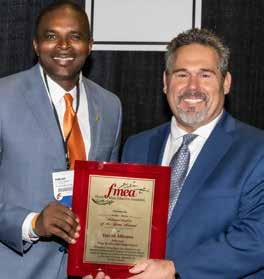
 Clint Randles, PhD Chairperson
Clint Randles, PhD Chairperson

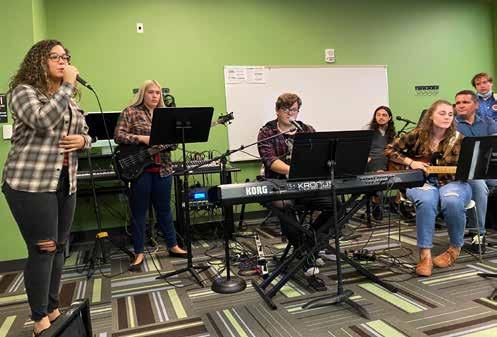
We,like many human beings on the planet, watched in wonder as everything stood still during the pandemic. We did everything at home, including make our music. Some of us had been talking about online learning in music prior to the pandemic. After the pandemic it seemed that many more people were interested in what online learning might mean for music education and life in general. The time was right for people to start talking about how to make professional quality recording possible in remote locations through the use of computers, interfaces, outboard and software-based gear, and recording microphones of diverse variety.
Many of us started down a trail toward the pursuit of better capabilities to record from home during the pandemic months. Those of us who could do it well continued making music during those difficult months. Some of us caught a better glimpse of what augmented capabilities for recording might mean in classrooms. With the rise of school studios comes the hope that school record labels will emerge, giving students and communities a blueprint for how this form of music-making can continue beyond the primary and secondary school music years. Everything played back on any type of device or media was recorded by someone. We can get better at an essential skill in the transmission of our art form. We have been missing out in
spreading the essential skill of recording arts in music teaching settings. Recording should be given as much prominence in our minds and curriculum design as does live performance. It should be half of what we do in music classrooms!
At the end of the pandemic I had just finished Music Teacher as Music Producer: How to Turn Your Classroom into a Center for Musical Creativities (Randles, 2022) and had started working on Growing Songwriting: Nurturing Student Creativities in the Classroom and Beyond (Randles, 2024). Interest in music production was at an alltime high in my 20 years of teaching and learning in diverse K-16 settings. It seems that now might be the best time to be a music teacher, the right place and time for
me to help the profession with resources to accomplish the change in curricula that many pioneers of music education have worked to accomplish. These are exciting times!
In North America, a lot of effort is being exerted to teach kids how to perform on the instruments that make up a modern band: drums, keyboards, bass, guitar, ukulele, turntable, etc. Attention is also being given to helping teachers understand how to help kids write their own songs. Up to this point, we have not fully realized the power of allowing kids to create, record, and share their own tracks, playlists, and albums. That requires music educators to know a lot more about recording and engineering audio. The world of musical products is calling us into that space.


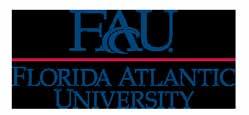





The mission of The Florida Music Educators Association is to promote quality, comprehensive music education for all Florida students as a part of their complete education.
Theschool year is off and running. We are excited about the start of the school year and the wonderful work being accomplished in music education classrooms because of our incredible Florida music teachers. Teaching is the most important job in the world. That’s because we make a difference and we change student’s lives.
The National Association of Music Merchants (NAMM) and the National Federation of High Schools (NFHS) have developed an interactive resource for students to look at careers in music education and creative industries titled “Why go into the music profession?” It can be viewed at https://artsadvocacy.nfhs.org/careers-in-music.

January 10-13, 2024
Preregistration is open for the 2024 FMEA Professional Development Conference at FMEA.org/conference/ Be sure to watch the FMEA website to take advantage of everything we offer during this excellent conference in Tampa. FMEA leadership and staff are looking forward to seeing everyone in January. Please note that the deadline for early registration is December 13, 2023, at midnight.
The FMEA hotel block opened September 30, 2023. The room block fills up quickly, but there will be a release of rooms that become available during the booking period, so remember to check back weekly. Please note that the
FMEA Executive Director Kathleen D. Sanz, PhD
deadline to cancel an unneeded hotel room is November 11, 2023, at 5 pm, after which time your credit card will be charged a nonrefundable one-night fee. See information in this magazine.
Teacher Satisfaction Survey
Florida teachers participated in a national Teacher Satisfaction Survey conducted by the National Federation of High Schools (NFHS). FMEA will be analyzing the data, specifically for Florida music educators, and developing strategies based on the results of the survey. There will be a session presented at the 2024 FMEA Professional Development Conference in January. Participants will be asked to provide feedback on strategies that are needed for Florida music educators.
The Professional Development Committee, with chairperson Ajori Spencer, is preparing additional professional development opportunities for our members. Stay tuned!
w The Florida Orchestra Association Fall Conference will be held October 12-13, 2023, in Orlando. Please see the exciting information on their website for more information.
w The Florida NAfME Collegiate chapters from throughout the state, which include a majority of our colleges and universities, will conduct a fall conference November 4-5, 2023, at the University of Central Florida. Information is on their website.
Have a wonderful school year and stay in tune with FMEA and the many opportunities for you in this rewarding profession.
Kathleen D. Sanz, PhD